Saturday June 30, 2012
Why a Patriotic WWII Film Starring Frank Sinatra Would Get Booed by Modern Republicans
The first thing you notice about “The House I Live In” is that Sinatra looked good. You finally understand what all those bobbysoxers were screaming about. Plus the jacket. C'mon.
Then in the middle of the film (4:22), he delivers a lesson on religious tolerance to tough neighborhood kids who've been beating up on another boy of another religion. He tells them this:
Listen, fellas. Religion makes no difference--except maybe to a Nazi or somebody who's stupid. Why, people all over the world worship God in many different ways. God created everybody. He didn't create one people better than another. Your blood's the same as mine, mine's the same as his. Do you know what this wonderful country is made of? It's made of a hundred different kinds of people, and a hundred different ways of talking, and a hundred different ways of going to church. But they're all American ways.
It's common sense but kind of stunning to hear in 2012, and it's indicative of how reactionary the far-right has become. A cornball patriotic film with Frank Sinatra made nearly 70 years ago, in the middle of World War II, is a bastion of tolerance compared with the 21st century GOP. If someone said the above at a Tea Party rally, they'd get booed off the stage.
So I guess the question Tea Party folks have to ask themselves is: Are you a Nazi, or are you stupid? Frank is waiting for your answer.
Saturday June 30, 2012
What Seattle Means to Me
What is America to me
A name, a map, or a flag I see
A certain word, democracy
What is America to me--Frank Sinatra singing “The House I Live In,” with lyrics by Abel Meeropol and music by Earl Robinson
What does Seattle mean to me?
Yesterday after work, I was biking home to First Hill from lower Queen Anne but was having brake problems. I'd had the brakes replaced about a month ago at Velo Bike Shop on Capitol Hill, and ever since the front brakes stuttered, and now they were squeaking noisily. Screeching almost. So I biked over to Velo, they fixed them on the spot, then I  biked a bit around Capitol Hill before coming back via Madison. I was at the corner of Madison and Boren, first in line in the left-turn-only lane, with a motorcycle behind me, revving its engine, both of us waiting on the green arrow. But it didn't come. We waited out the cars traveling south on Boren, and north on Boren, and the moment before the east-west traffic moved, the moment we were supposed to get the green arrow ... didn't arrive. Because the system didn't register a car there. Because there wasn't a car there: there was just a bike, followed by a motorcycle, followed by a car. The system mostly registers cars. The motorcycle began to creep forward and we had this conversation.
biked a bit around Capitol Hill before coming back via Madison. I was at the corner of Madison and Boren, first in line in the left-turn-only lane, with a motorcycle behind me, revving its engine, both of us waiting on the green arrow. But it didn't come. We waited out the cars traveling south on Boren, and north on Boren, and the moment before the east-west traffic moved, the moment we were supposed to get the green arrow ... didn't arrive. Because the system didn't register a car there. Because there wasn't a car there: there was just a bike, followed by a motorcycle, followed by a car. The system mostly registers cars. The motorcycle began to creep forward and we had this conversation.
Me: You should get closer. It's not registering me.
He: Yeah, sometimes it doesn't register me, either.
Me: Great, what do we do?
Then I saw what he was doing. He was going anyway. He was waiting for the eastbound traffic to dissipate, then he turned left against the red arrow. “Oh, right,” I thought. “We can do that.” I did the same.
That happens a few times a year, by the way, and it's not what Seattle means to me. Here's what Seattle means to me.
As we were turning, I heard a horn honking. Insistently. The motorcyclist's? To warn people what we were doing?
No, it was the car behind us. Admonishing us because we were doing something bad.
And that's what Seattle means to me.
The system is set up in a way to screw you over; and when you improvise, there's always someone there, someone who wouldn't normally talk to you, scolding you for it.
Friday June 29, 2012
Greatest Use of the Parenthetical ... Ever?
Louis Menand, who's too smart for this country, has, in the latest issue of The New Yorker, a good piece on a new James Joyce biography. As New Yorker writers are wont to do, he spends more column inches delivering his own mini-bio of the artist as young, middle-aged and old man than in actually reviewing the book. But it's a great read. It also includes my favorite recent example of the parenthetical.
Menand writes about Joyce's love of puns. He writes about the near autobiographical nature of his work. He writes about how some of his characters have the same names as the people they were based upon, and that's why Joyce never returned to Ireland, because he was afraid of libel suits. He writes about Joyce's favorite writer, Dante, “another exile, who created a verbal universe that he populated with old Florentine comrades and enemies, each caricatured with exquisite precision for all time, and who placed at the center of his imaginary cosmos a woman he had fallen in love with after seeing her on the street, Beatrice Portinari.”
Then he goes into Joyce's Beatrice, Nora Barnacle, a Galway girl, who, in 1904, was working as a chambermaid in Dublin when Joyce saw her on the street and asked her out. She didn't show for the first date. She did for the second. Menand writes:
They walked to Ringsend, on the south bank of the Liffey, where (and here we can drop the Dante analogy) she put her hand inside his trousers and masturbated him. It was June 16, 1904, the day on which Joyce set “Ulysses.” When people celebrate Bloomsday, that is what they are celebrating.
I read that last night. Laughed out loud. The entire piece can be found here: “Silence, Exile, Punning: James Joyce's chance encounters.”
In the meantime, other great examples of the parenthetical? Bueller?

...and yes I said yes I will Yes.
Thursday June 28, 2012
Two Reasons Conservatives Should Be Proud SCOTUS Upheld Obamacare
1. The individual mandate, the crux of the suit against Obamacare, was their idea in the first place:
The mandate made its political début in a 1989 Heritage Foundation brief titled “Assuring Affordable Health Care for All Americans,” as a counterpoint to the single-payer system and the employer mandate, which were favored in Democratic circles. In the brief, Stuart Butler, the foundation’s health-care expert, argued, “Many states now require passengers in automobiles to wear seat-belts for their own protection. Many others require anybody driving a car to have liability insurance. But neither the federal government nor any state requires all households to protect themselves from the potentially catastrophic costs of a serious accident or illness. Under the Heritage plan, there would be such a requirement.” The mandate made its first legislative appearance in 1993, in the Health Equity and Access Reform Today Act—the Republicans’ alternative to President Clinton’s health-reform bill—which was sponsored by John Chafee, of Rhode Island, and co-sponsored by eighteen Republicans, including Bob Dole, who was then the Senate Minority Leader.
--Ezra Klein in “Unpopupular Mandate” in the June 25, 2012 New Yorker
2. Calling the mandate a 'tax,' the argument that won the day, was their idea, too:
In declaring the mandate a tax, [Chief Justice John] Roberts broke with President Obama, who had publicly insisted the law didn't constitute a tax.
Roberts declared that Congress could not force citizens to buy health insurance under the Commerce Clause—agreeing with the four conservative justices on that point—but that the Commerce Clause ultimately didn't matter, because the mandate fell under Congress's power to levy taxes.
Graetz said it wasn't a matter of Roberts', or any of the justices' ideology; it's simply that tax law has always been broadly interpreted. ...
“That's clearly constitutional. No one says that's not constitutional. That was upheld long ago. The only question is whether because they didn't call it a tax, that would mean it wasn't a tax,” he said. “Obviously Justice Roberts didn't think what the president called it had any legal effect.”
--Reid Pillifant, “How John Roberts Saved Obamacare,” Capital New York
I give Mitt Romney a month before he starts taking credit for it.
UPDATE: Rick Perlstein, author of “Before the Storm” and “Nixonland,” writes about the core conservatism of Obamacare (psst: individual responsibility and reduction of tax-eaters) in The New York Daily News.

This time, they were in rhythm.
Thursday June 28, 2012
The History of Spider-Man On Screen
In 1967, this was cool:
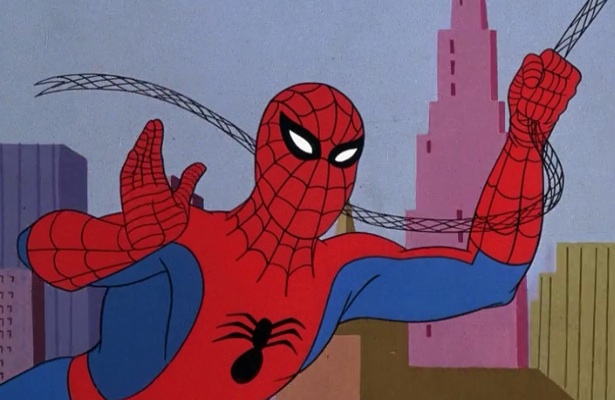
And this:
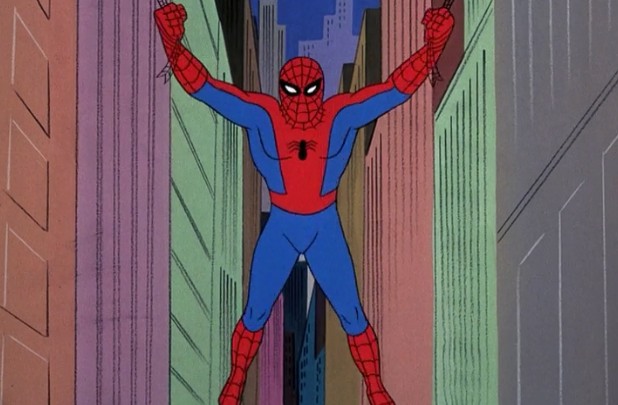
In 2002, it became this:

And this:
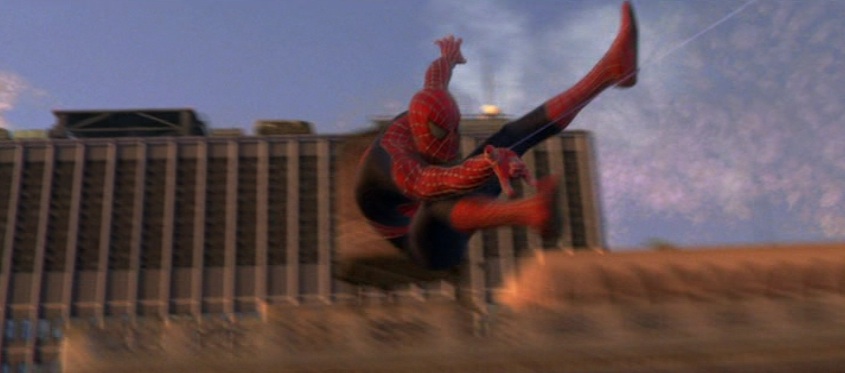
What will the new incarnation give us? How much more real can it get?
Five years ago, for MSNBC, I wrote about the history of Spider-Man on screen. I applauded the first two movies and disparaged the third. In the link to the article, you'll also find Nicholas Hammond and Electric Company versions of Spidey. Whallopin' Websnappers!
New chapters getting written all the time. See you next week!

Wednesday June 27, 2012
Why We Should All Be Like Frank Sullivan
“Dear Jane, it would distress me big time if you were to lose a minute's sleep over this. I know I haven't. And besides, you're probably not off by much.”
--Former Red Sox pitcher Frank Sullivan, 82, responding via email to author Jane Leavy, who had referred to him as “the late Frank Sullivan” in her book, “The Last Boy: Mickey Mantle and the End of America's Childhood.” As reported in her article, “Sully and the Mick” in the book “Damn Yankees: Twenty-Four Major League Writers on the World's Most Hated (and Loved) Team.”
When she phoned to again apologize, he was again classy and humorous. “Water off a duck's back,” he said. “Don't forget you're dealing with a guy who was booed by thousands.”
Later in his career, Sullivan, who was 97-100 with a lifetime 3.60 ERA, appeared in two All-Star games, and ended his career in Minnesota about the time I was being born in Minnesota, posed for Norman Rockwell's Saturday Evening Post cover “The Rookie.”
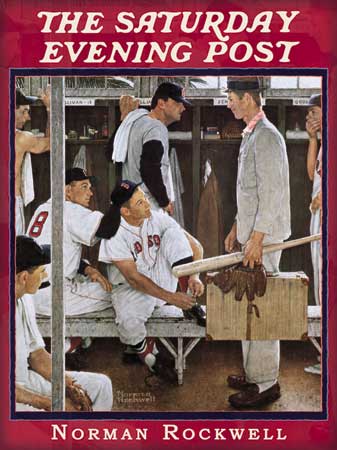
Sullivan, No. 18, third from left.
Tuesday June 26, 2012
A Team without Superstars
Remember when they said that of the vaunted 2001 Mariners? After we lost Randy, Junior and A-Rod and kept on winning? A team without superstars. After one game, mid-season, I remember someone, possibly Ron Fairly, trotted this out again, and Dave Niehaus responded, “Oh, there's a superstar.” He meant Ichiro.
Well, give or take a king on the mound, we're now truly a team without superstars. But this time we're a sucky team without superstars.
Today I was looking at our abyssmal OBP and SLG and OPS numbers, and then noticed that our best OPS from an everyday player was the .772 mark shared by Kyle Seager and Michael Saunders, noticed again that they were ranked 77th and 78th in the Majors, and wondered if every team had a player above our best player.
The answer? Yes. Every team has a player above our best player. Only San Diego really makes it close.
| Team | Best player | 2nd Best | 3rd Best | 4th Best | 5th Best |
| Cincinnati | 1 | 33 | 67 | ||
| Texas | 2 | 25 | 53 | 68 | 76 |
| NY Mets | 3 | 69 | |||
| Boston | 4 | ||||
| Milwaukee | 5 | 50 | 59 | ||
| St. Louis | 6 | 24 | 28 | 48 | |
| Philadelphia | 7 | 52 | |||
| Colorado | 8 | 18 | 57 | ||
| LA Angels | 9 | 15 | |||
| Pittsburgh | 10 | ||||
| Chi Sox | 11 | 30 | 47 | 60 | |
| NY Yankees | 12 | 38 | 42 | 62 | 63 |
| Toronto | 13 | 27 | 49 | ||
| Minnesota | 14 | 34 | |||
| Detroit | 16 | 21 | 29 | ||
| Baltimore | 17 | 61 | 66 | 72 | |
| Tampa Bay | 19 | 65 | |||
| San Francisco | 20 | 43 | |||
| Miami | 22 | 70 | 75 | ||
| Arizona | 23 | 26 | 37 | 56 | |
| Oakland | 31 | ||||
| Atlanta | 32 | 44 | 54 | 64 | |
| Cleveland | 35 | 55 | |||
| Kansas City | 36 | 46 | 71 | ||
| LA Dodgers | 39 | 41 | |||
| Houston | 40 | 58 | 74 | ||
| Washington | 45 | ||||
| Chi Cubs | 51 | ||||
| San Diego | 73 | ||||
| Seattle | 77 |
In fact, 23 teams have a second player ranked before the M's first, and exactly half (15) have a third player. Seven teams have a fourth player, and two teams, Texas and the Yankees, have a fifth player whose OPS is better than the M's best player.
Yeesh.
That's part of why it's so difficult watching these games. There's no one scary in our lineup. Not one. Not even close.
On the plus side, we do have a second player on the list before the Padres. Plus our team is young, and they play at Safeco.
But a star would be nice. Or at least a bright light.

Safeco Field: No bright lights, no big city.
Tuesday June 26, 2012
Quote of the Day
“In the end, it ended as it had to end. Cleveland waits. And LeBron James won just like he knew he would.”
--Joe Posnanski in his bittersweet post, “LeBron: Champion”

Tuesday June 26, 2012
Jordy's Reviews: Brave (2012)
The following was written by my nephew, Jordan, who turns 11 next month, and who has written a pack of reviews before. You can also view his own movies on YouTube...
I love Pixar. To be honest, who doesn’t? They have beautiful animations and have almost always managed to get love and praise by viewers and critics alike.
But, in 2011, they released Cars 2, the first movie that got iffy reviews for a Pixar made film. Now they have released Brave, the first hinted adventure film Pixar has ever made, and is it good? The real question that I found myself asking is, “Is it good by Pixar standards?"
Kind of.
The movie is about a girl named Merida (voiced by Kelly Macdonald) who is about to become a princess. However, she wants to be Indiana Jones’ Gal, and momma thinks otherwise. So she asks for a spell to change her mother’s mind. However, she’s not specific enough to ask the witch to change her mind about her HAVING to be the princess. So she asks to change her mom. Next thing she knows, she has turned her momma into a bear, and like every single curse, she has a limited time to take the spell back.
The story was not the best. It’s not on the levels of Pixar standards. However, there were enough clever things. My favorite part of the movie was when Merida took a ride on her horse, showing her amazing archery skills to the audience. Then we get the most visually stunning scene in the movie in the same part. The scene, which was towards the beginning, made me disappointed that most of the movie was set in the castle or the woods and not in the surrounding area, and when they have a part that seems like a long road ahead, they jump cut to the place. That just HAD to be covered with fog. NOOOO!!!!!
I do have to say that the voice acting was good. The mother-daughter relationship is very good, and adds depth to a movie that desperately needs it. The script is believable. Plus, I really don’t want to just look for flaws in the movie, because that just takes the fun out of watching a movie.
The movie is surprisingly funny for a much darker Pixar movie, but not when it needs it most. My horror movie scriptwriter teacher says, “Humor makes the scary part more scary.” Words to live by, but not for this movie, which has scary parts but not much humor in them. Hint hint, Pixar!
Also, the movie sometimes feels like Merida only focuses on the problems of her Mother and the kingdom, and not her little mischievous red-haired brothers, who can cause some big problems. (Mom, I’m not describing myself!)
Despite my complaints, I am bashing a great movie that could have been greater. I feel that I am being unfair to a movie that I’d take over Cars 2, but not Toy Story or most of the other Pixars. It’s unfair to make it seem like this movie’s bad when it’s up against some of the best animated movies of all time, and probably THE best animated movies.
81%
Okay For 7+
~Jordan Muschler

Monday June 25, 2012
Song of the Day: ‘Civil War’ by Joe Henry
Some fighters came and pitched a tent
And everyone around here went,
The fix was in but we bet and we swore
From both sides of a civil war
We build this up and we knock this down
We call our little mob a town
We nail a sign up above the door
“God bless our little civil war”
“God bless our little civil war”
—Joe Henry, “Civil War,” from the album “Civilians.”
And, no, it doesn't remind me much of my country at the present moment. Of course not. Not at all.
Monday June 25, 2012
Movie Review: The Woman in the Fifth (2011)
WARNING: SPOILERS
There’s a moment in “The Woman in the Fifth” when the title character, Margit (Kristin Scott Thomas), having just given a handjob to down-on-his-luck novelist Tom Ricks (Ethan Hawke), leads him into another room in her high-ceilinged luxury apartment in the fifth arrondissement of Paris. The next shot is a close-up of an incredibly handsome man, with bare shoulders and hair slicked back, and, for a second, I wondered if Margit had led Tom into some kind of orgy with an Italian model. Then it dawned on me: Oh, that’s Tom. That’s Ethan Hawke. She’s bathing him.
Pause.
That’s right. He’s handsome.
 You forget watching “The Woman in the Fifth” (“La femme du Vème”). His character is so skittish and drawn, peering at the world through crooked, smudged glasses, and wearing the same musty clothes (hence the bath), that you forget the guy’s a movie star. Women in the movie are forever removing those glasses. With reason. They’re too askew, and the lenses enlarge his unstable eyes too much. They’re the glasses equivalent of Jack Nicholson’s bandaged nose in “Chinatown.” They’re so unflattering you can’t imagine a movie star wearing them.
You forget watching “The Woman in the Fifth” (“La femme du Vème”). His character is so skittish and drawn, peering at the world through crooked, smudged glasses, and wearing the same musty clothes (hence the bath), that you forget the guy’s a movie star. Women in the movie are forever removing those glasses. With reason. They’re too askew, and the lenses enlarge his unstable eyes too much. They’re the glasses equivalent of Jack Nicholson’s bandaged nose in “Chinatown.” They’re so unflattering you can’t imagine a movie star wearing them.
An actor, on the other hand...
When did I begin to hate Ethan Hawke with the white hot hatred I usually reserve for members of the New York Yankees? Was it “Reality Bites”? The offhand way he explains the meaning of ‘irony’ to poor Winona Ryder? Was it the fact that he published a novel, “The Hottest State,” in 1996, at a time when I was trying and failing to get short stories published? Was it the privileged, pretentious way he moved through that privileged, pretentious decade? And when did I begin to let go of this unnatural hatred? “Training Day” helped. “Before Sunrise”/“Before Sunset” were OK but he played pretentious in the first and novelist in the second. So it must’ve been his loser brother in “Before the Devil Knows You’re Dead.” He stole the film from Philip Seymour Hoffman. I watched for Philip, despite Ethan, and Ethan blew me away.
He does it here, too. He’s a novelist again, with one published book, but you wouldn’t know it looking at him. He seems stunted. Every move he makes is tentative and uncertain. At times he tries to act confident, as before a lawyer, but his bluster augments the uncertainty in his face. It’s hollow and painful and followed by bursts of unrepentant anger. It’s no surprise when we find out he was recently in a mental institution.
As the movie opens, we see him bluffing his way through immigration, bluffing his way into a Parisian apartment building, and when a woman, Nathalie (Delphine Chuillot), tries to shut the door in his face, he pushes his way in. He speaks a passable French but talks to her in English (“Can’t we talk like normal people”) and she responds in clipped French (“Tu n’est pas normal”). Turns out she’s his ex-wife, but he’s less interested in her than in seeing his six-year-old daughter, Chloe (Julie Papillon), and, voila, runs into her as he’s leaving the building. She’s glad to see him; she’s not scared the way Nathalie was. He’s happy she wears glasses like his. Later, he’ll tell her, “You see the world like I do.” Even then, that doesn’t seem like a good thing.
He’s still on the run, though. Nathalie’s called the cops, so he leaves Chloe and tugs his luggage down the street. After falling asleep on a bus, his luggage and wallet are stolen. When he complains, the bus driver tells him, “Go to the police.” The very thing he can’t do.
In this manner he winds up in a rundown Arab cafe/hotel at “Au bon coin” (the Good Corner), which has a pretty Polish waitress, Ania (Joanna Kulig), and where he has to give up his passport to the owner, M. Sezer (Samir Guesmi), to get a small, dingy, second-floor room with a loud, angry neighbor, Omar (Mamadou Minte), who doesn’t flush their shared toilet. At the same time, some luck: Sezer, who may or may not be a petty gangster, gives him a job, €50 a night, to monitor a videocamera in a dingy, locked room, and let in anyone who asks for “M. Monde.” Then at une librairie anglaise, he’s recognized for his first novel, “Forest Life,” and invited to a swanky literary party, where he runs into Margit (Scott Thomas), whom we know to be our titular character, a potential femme fatale, with whom he talks on a balcony overlooking the base of the Eiffel Tower. She’s direct and gives him her card. When he shows up at her place, with a few scraggly flowers in his fist, we get the handjob scene mentioned in the opening graph.
So what’s her game? What’s his? He’s trying to see his daughter, as a father rather than as a stranger on the wrong side of the playground fence. In the meantime he writes her a long letter complete with drawings of woodland creatures, as in the enchanted forest of his first novel, which Ania finds in a Polish translation and reads. She’s impressed and he winds up sleeping with her, too. Unfortunately, Ania is Sezer’s girl, and Omar attempts to blackmail him. He leaves a note:
1,000 EUROS TOMORROW OR YOU’RE DEAD.
Margit, for her part, remains supremely confident in Tom. She tells him his next novel will be great since he has all this material: Sezer, down-and-out in Paris, her. He confides in her about Omar’s threat but she dismisses it:
Tom: You have no idea what these people are capable of.
Margit: You have no idea what you are capable of.
Then things move fast. Upon returning to au bon coin, he can’t open the second-floor WC. It’s blocked. Yes, by Omar, who sits on the toilet, dead, with a plunger down his throat. The cops come and question Tom about his arguments with Omar; they show him the blackmail note with his fingerprints on it. One wonders: Did Sezer set him up? To get back at him for Ania? Tom winds up in a solitary jail cell. Can he sink any lower?
He can. Margit is his alibi, and he tells the cops where she lives. But she doesn’t live there. She’s not even alive. She’s been dead since 1991.
But suddenly he’s released. The police have a new suspect, Sezer, who, when he sees Tom, reacts angrily, claiming Tom set him up.
Throughout the movie, intercut with the action, we’re shown dreamy images of a forest, like the one from Tom’s novel, with a girl in a colorful dress, blurry and just out of view, leaning against a tree. Is she dead? At one point we wonder if it’s Ania in her flower print dress. But when Chloe goes missing, we know it’s her. Not dead, though. We see her wandering back into the city, and the police pick her up and reunite her with her distraught mother. Tom, meanwhile, is reunited with Margit, who represents madness or death. At the end of the movie, he shows up at her door again, sees a flash of white hot light, and gives into it completely.
“The Woman in the Fifth,” the work of Polish writer-director Pawel Pawlikowski, is a smart, atmospheric, noirish thriller that clocks in, like a true 1940s noir, in under 90 minutes. I went in not expecting much. It has a 5.1 IMDb rating, so I assumed pretentious; I assumed it would fall apart. It doesn’t. I was hooked from the beginning. I’m still hooked.
We see the world through Tom’s eyes, like his daughter, and once we know that Margit doesn’t exist we try to figure out who does. Omar? Sezer? Ania? He could be imagining the whole thing from an asylum in England. It would explain why he often winds up in cells: the small chambre, the video room, the jail. It would explain why Paris is mostly empty side-streets.
Indeed, some post-coital conversations suggest that the entire movie is in his head:
Ania: It’s not good for you here.
Tom: There is no ‘here.’
With Margit:
Tom: I feel like the real me is somewhere else ... and the one that’s here is like a sad double.
At the same time, this last line is eminently relatable. Most of us have felt this way. How did I wind up here? Wasn’t I due for better things? Yet here I am. We don’t have to be in mental institutions to feel this way; we just have to be human.
Me, I want Omar, Sezer and Ania to be real. I think the movie’s better this way. So, yes, Tom is in Paris. Yes, he kills Omar but doesn’t remember it. Yes, he kidnaps his daughter. That’s why he returns to Margit. He gives in to the white hot light of death/madness to protect his daughter from himself.
That’s why he does what he does with the letter, too. That’s why it’s poignant. He’s been writing it throughout the movie. It’s long. But in the end he doesn’t trust it, or himself, enough. So to protect her, to make sure she doesn’t see the world through his eyes, he throws the letter in a trash bin. Then he returns to retrieve one page, which he tears in half. That’s the one he mails. It contains two words: Love, Dad.
Sunday June 24, 2012
Hollywood B.O.: Brave New World for Pixar
Last Friday, Box Office Mojo's headline trumpeted Pixar's long-standing reign atop the domestic box office:
Pixar Aims for 13th-Straight First Place Debut with 'Brave.'
That is indeed impressive, and “Brave” performed impressively, grossing $66.7 million in 4,164 theaters, far outpacing the other big debut film, “Abraham Lincoln: Vampire Hunter,” which grossed just $16.5 million in 3,108 theaters. “Madagascar 3” fell off by 40% but still finished in second place with $20 million.
“Brave” is, of course, the first “girl-centered” Pixar product. So how does that $66 mil stack up against other Pixar films?
Not badly:
| Date | Movie | Opening | Theaters | Total Gross | Release |
| 1 | Toy Story 3 | $110,307,189 | 4,028 | $415,004,880 | 6/18/10 |
| 2 | The Incredibles | $70,467,623 | 3,933 | $261,441,092 | 11/5/04 |
| 3 | Finding Nemo | $70,251,710 | 3,374 | $339,714,978 | 5/30/03 |
| 4 | Up | $68,108,790 | 3,766 | $293,004,164 | 5/29/09 |
| 5 | Brave | $66,739,000 | 4,164 | $66,739,000 | 6/22/12 |
| 6 | Cars 2 | $66,135,507 | 4,115 | $191,452,396 | 6/24/11 |
| 7 | WALL-E | $63,087,526 | 3,992 | $223,808,164 | 6/27/08 |
| 8 | Monsters, Inc. | $62,577,067 | 3,237 | $255,873,250 | 11/2/01 |
| 9 | Cars | $60,119,509 | 3,985 | $244,082,982 | 6/9/06 |
| 10 | Toy Story 2 | $57,388,839 | 3,236 | $245,852,179 | 11/24/99 |
| 11 | Ratatouille | $47,027,395 | 3,940 | $206,445,654 | 6/29/07 |
| 12 | A Bug's Life | $33,258,052 | 2,686 | $162,798,565 | 11/27/98 |
| 13 | Toy Story | $29,140,617 | 2,457 | $191,796,233 | 11/22/95 |
Interestingly, with the exception of “Ratatouille” on the low side and “Toy Story 3” on the high, every Pixar movie this century has opened in the $60-$70 million range, and, of course, $66 mil is right in the middle of that.
But if you adjust for inflation you get a slightly different story:
| Movie | Opening | Theaters | Release | |
| 1 | Toy Story 3 | $110,867,100 | 4,028 | 6/18/10 |
| 2 | Finding Nemo | $92,270,900 | 3,374 | 5/30/03 |
| 3 | The Incredibles | $89,871,800 | 3,933 | 11/5/04 |
| 4 | Toy Story 2 | $89,472,400 | 3,236 | 11/24/99 |
| 5 | Monsters, Inc. | $87,563,700 | 3,237 | 11/2/01 |
| 6 | Cars | $72,694,100 | 3,985 | 6/9/06 |
| 7 | Up | $72,308,500 | 3,766 | 5/29/09 |
| 8 | WALL-E | $69,589,600 | 3,992 | 6/27/08 |
| 9 | Brave | $66,739,000 | 4,164 | 6/22/12 |
| 10 | Cars 2 | $64,986,800 | 4,115 | 6/24/11 |
| 11 | A Bug's Life | $56,162,900 | 2,686 | 11/27/98 |
| 12 | Ratatouille | $54,136,200 | 3,940 | 6/29/07 |
| 13 | Toy Story | $53,056,000 | 2,457 | 11/22/95 |
It's not just “Brave.” With the exception of “Toy Story 3,” Pixar's big openings came with the four movies released between 1999 and 2004. Since then it's been kinda same-old, same-old. Their movies are in more theaters and grossing less.
Is it the movies themselves? The association with Disney? Are parents waiting for the DVD to shut the kids up?
“Brave” needs good word-of-mouth to keep going. “Up” and “Cars 2” opened similarly, but “Cars 2,” which was forgettable and poorly reviewed (38% on RT), finished with $100 million less than “Up,” which was unforgettable and spectacularly reviewed (98%).
“Brave”'s RT numbers are middling-positive: 74%. Should we guess a final domestic tally of $240 million?
In other B.O. news, “Prometheus” (4th) passed the $100 million mark, “Madagascar 3” (2nd) passed the $150 million mark, and “The Avengers” (8th) grossed another $7 mil to come within spitting distance, or $1.7 million, of $600 million. It will be the first non-James Cameron movie to reach that mark.
The boyish-yes-but-I-like-it-too numbers here.

Girls with bows don't need bows.
Sunday June 24, 2012
Other People's Reviews: Alex Bradbury on 'Prometheus' (2012)
Patricia's brother, Alex Bradbury, a marine biologist who works and lives on the Olympic peninsula, and author of several books on Brazil and Belize, is, it turns out, a big fan of Ridley Scott's “Alien.” Its prequel? “Prometheus”? He had this to say...
The best thing to be said for “Prometheus” – besides Idris Elba playing the concertina – is that it has inspired me to see “Alien” again. I saw it six, maybe seven times in the decade after it came out in 1979, and I still consider it one of the greatest horror films ever made.
Science fiction has never really interested me, in either print or film. And for me, “Alien” was always a classic horror film that happened to take place in outer space, not a sci-fi film. Indeed, almost all the best elements of the whole movie could have been moved to Earth and it would have still been a great horror movie. The alien itself, for example, especially in its most horrifying and believable life-forms –- the face-hugger and chest-buster juvenile forms –- could easily have been a previously undiscovered parasitic creature from anywhere on this planet: a rainforest, or a remote research station in Antarctica (a la “The Thing”). Perhaps a tug in the middle of the Pacific could come upon a piece of tsunami debris with strange egg-like life forms adhered to it. The only important aspect of “Alien” that wouldn’t translate easily to Earth would be H.R. Giger’s gorgeously creepy interiors of the spacecraft and the the planet’s landscape.
 All of these elements are present in “Prometheus,” of course. The problem is we saw them all back in 1979 in the original masterpiece. Granted, we’ve had 30-plus years of improvements in special effects technology since then. And if “Alien” had been filled with clunky clay-animation effects from the stone age of cinema, a remake might have been justified on technical grounds alone. But that wasn’t the case. “Alien” looks nearly as good today as it did in 1979, down to every detail of the creature and every piece of set design.
All of these elements are present in “Prometheus,” of course. The problem is we saw them all back in 1979 in the original masterpiece. Granted, we’ve had 30-plus years of improvements in special effects technology since then. And if “Alien” had been filled with clunky clay-animation effects from the stone age of cinema, a remake might have been justified on technical grounds alone. But that wasn’t the case. “Alien” looks nearly as good today as it did in 1979, down to every detail of the creature and every piece of set design.
With nothing new on that score to offer, “Prometheus” instead heaps on all sorts of unnecessary sub-plots, characters, and confusing philosophical ideas. “Alien” had a simple plot similar to “The Thing”: a remote station with a small crew is infected with an alien parasite/predator – today we might call it an “invasive species” — that knocks them off one by one. There was only a single sub-plot: the android working covertly for the corporation in order to get the creature back home, possibly for future use as a weapon. And even that single sub-plot in “Alien” could have been dropped as an unnecessary distraction (although we would have lost the scene where Ian Holm loses his head).
But in “Prometheus,” we get all sorts of unnecessary distractions: humanoids that have apparently landed on Earth and left their DNA, archaeological themes, and all sorts of philosophical and religious mumbo-jumbo. There are also far too many crew members and characters in “Prometheus.” Nostromo had a crew of seven, a good number for suggesting isolation and helplessness, while at the same time supplying the necessary fodder for the creature to destroy. The crew of Prometheus is at least fifteen, probably more when the hidden character (Weyland) and his entourage are revealed. There’s less terror when you’ve got a crowd like that, and less chance to build a little empathy with your characters. And most of the extra cast is pointless anyway from a plot standpoint. What point does Peter Weyland serve, for instance, and why should we be shocked to learn that the Charlize Theron character is his daughter? (And why, for that matter, is he wearing that awful prune-face makeup?).
There are even too many aliens in “Prometheus.” I like monsters, and these film parasites remind me of the very real creatures I saw today at work, pawing through mud on the beach — wriggling segmented pileworms, for example, with a semi-circle of tiny biting teeth. Because they were all so thoroughly and horribly believable, I enjoyed the various creepy life-forms that the parasite took in “Prometheus.” And there is some basis in biological reality for a series of distinctly different morphs of the same creature as it grows. But in this film, those different forms became confusing after a while. Were there actually several different parasites involved, or is this still the same single species ? “Alien” showed the creature in, at most, four life-forms: the egg, the face-hugger juvenile, the chest-buster juvenile, and the fully formed adult predator. Here we seem to have more variations yet, and I got the feeling that Ridley Scott simply wanted to throw all the great slimy creatures he had in his special effects arsenal at us, and hope we wouldn’t ask questions.
Likewise, there is far too much frenzied action, and a dearth of quiet nail-biting terror. I yearned for just a single scene as terrifying as the one in “Alien” where Harry Dean Stanton follows the ship’s cat into the bowels of the spaceship, water dripping from the pipes. It was a quiet, gut-churning episode, and there is nothing at all like that in this noisy mess of a movie. There are vehicles speeding about, flamethrowers, fights, gunfire, and exploding spaceships. Worse, much of the violence and action in “Prometheus” seems pointless, or at least unexplained. Why, for instance, does the giant humanoid fly into a rage and kill both Weyland and David — other than to provide us with another android beheading scene to echo the Ian Holm episode?
And speaking of gut-churning, the most harrowing scene in the movie shows Noomi Rapace surgically removing a parasite from her own body. But much of this episode’s power is lost on us, for two reasons: First, we know pretty much what’s going to come out – we saw it come out of John Hurt 34 years ago. Second, there is no element of surprise in this new film. When Hurt sat down to dinner we weren’t at all prepared for his little episode of indigestion. Even before watch “Prometheus” you know you’re going to see, at some point, some variation on the chest-popping scene. And Scott gives us way too much preparation for what’s coming, as Noomi grabs her gut and runs toward the surgery station. It’s gruesome alright, but not anything as shocking as the chest-popping scene in “Alien.”
Even some of the small charms of “Alien” are gone, replaced by stock sci-fi formulas. In “Alien,” the Nostromo was a space-going tugboat, its crew mostly blue-collar workers on a routine mission towing minerals. It was a nice touch, much like the gritty, funky vision of the future metropolis in “Blade Runner.” Prometheus, on the other hand, is on a scientific and archeological mission, filled with scientists, scholars and even, as it turns out, a “seeker” (Peter Weyland). And thus we are back in the pompous, cliché-ridden world of “Star Wars” and “2001: Space Odyssey.” There is even a reference or two to the latter film in “Prometheus.” Unlike “Alien”, this new film can definitely be pigeon-holed in the sci-fi bin. And the most annoying, pointless yet puffed-up episode in the whole film involves a swirling light-show of planets, stars and swirling lasers. Like drum solos and dream sequences, it seemed to last forever.
I can’t say that “Prometheus” was disappointing since I wasn’t expecting much. Scott is at his most entertaining when he’s working in totally new territory that he hasn’t explored before – “Gladiator” is a good example --- and I had low expectations for a special-effects extravaganza prequel to “Alien.” But I was hoping for a bit more focus. This was a hodgepodge. I walked out of “Alien” absolutely stunned. I walked out of “Prometheus” bored and confused.
-- Alex Bradbury, Port Townsend, Wa.
Saturday June 23, 2012
Damn Amazon.com
Last week I bought the book, “Damn Yankees: Twenty-Four Major League Writers on the World's Most Loved (and Hated) Team,” edited by Rob Fleder, from Amazon.com. This morning I received the following email message from Team Bezos:

Oh, you sad little algorithms. “Customers who showed an interest in the New York Yankees might like to see autographed jerseys, trading cards, and more...” Right. Or they might like to see the New York Yankees in last place for the rest of the 21st century. They might like to see Derek Jeter trip and break his face. They might like to see Yankees fans forced to publicly apologize for their overall loutishness and general lack of hygiene.
It all depends, you see, on how you read the title Damn Yankees.
Saturday June 23, 2012
Quote of the Day
“I was born in 1928. Same year as Mickey Mouse, but he made out better—straight to Hollywood, straight to the cosmetic department. I did not approve of his buying into all that crap and letting his soul get despoiled. I remained poor and depressed, as a Brooklyn child should. Mickey wasn’t depressed but anyone who looked like him should have been. He became a schmuck, a very famous schmuck. And God knows I adored him, but I was a schmuck, too. I lived in Brooklyn.”
--Maurice Sendak (1928-2012), author of “Where the Wild Things Are,” to Marianna Cook, in a New Yorker Postcript, “Wild Things,” May 21, 2012. It's unfortunately an abstract of the article, not the whole thing. Fortunately, you can subscribe to The New Yorker, and should. And if you haven't seen Sendak in his two-part interview with Stephen Colbert, you should check that out, too. Sendak may be the best partner Colbert's ever had.
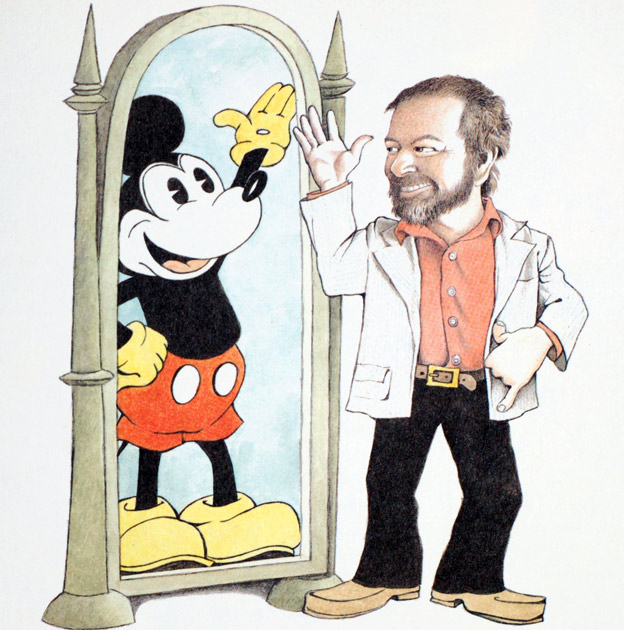
Friday June 22, 2012
Song of the Day: 'You Can't Fail Me Now' by Joe Henry
It's amazing how many times you can hear a song without hearing it.
I'm a fan of Joe Henry's “You Can't Fail Me Now,” from his album “Civilians.” I think it's beautiful and haunting. According to my iTunes application, I've listened to it 68 times. But it wasn't until the other night, Wednesday night, in the kitchen cleaning up after dinner, that this lyric finally sunk in:
We're taught to love the worst in us
And mercy more than life, but trust me:
Mercy's just a warning shot across the bow
Mercy's just a warning shot across the bow. Holy crap is that good. I don't know how true it is, but it makes me pause and consider and count up. To whom have I been merciful? Have I been in a position to be? And if so, how was I merciful? And what about after?
To be honest, I don't think I've been in a position to be merciful. That doesn't change my joy in the line.
The title and chorus can be interpretted different ways, of course: With hope or without. You can't fail me now because I'll love you no matter what; you can't fail me now because you always fail me, and I know it, so there's nothing to fail anymore. I tend to go with the latter interpretation. The song opens with a sense of stagnation and suffocation (“I know that fan is moving air”). Then there's the mercy line, which is basically saying: Let's not kid ourselves about ourselves. Or more directly: Mercy, my ass.
The video below is Joe singing the song a few years back in Amsterdam. I like the quiet rimshots during the intro.
Joe Henry is the Bob Dylan of his/my generation. Only a handful of people seem to know it.
Thursday June 21, 2012
Quote of the Day
“The maintenance of a complex society depends increasingly on routine work, work with no zest or creativity. The things we eat, clothes we wear, places we live become increasingly standardized, because standardization is the price we pay for the prices we are able to pay. Life ticks along for most of us like a Woolworth's alarm clock. We grow used to the rhythm imposed on us by our need to subsist: soon we get to like our bondage.”
--Anthony Burgess, “The Clockwork Condition: The author comments on his most famous book, in 1973,” in the June 4/11, 2012 issue of The New Yorker.
Happy Thursday.
Thursday June 21, 2012
Movie Review: Les femmes du 6ème étage (2010)
WARNING: SPOILERS
Is there no culture, no matter how free and sexy it seems to outsiders, who don’t see themselves as uptight and staid and in need of the wildness of another, generally more southern culture?
So as the British did with Italy in E.M. Forster’s novels and subsequent Merchant-Ivory films, and as Americans do in the Caribbean, getting their groove back, etc., so the French, in “The Women on the 6th Floor,” turn to Spain to shake off the shackles of their deadening, monetized, neutered civility. And they don’t even have to leave Paris to do it.
 It’s 1962, and Jean-Louis Joubert (Fabrice Luchini) and his wife Suzanne (Sandrine Kiberlain) live in relative luxury in an apartment in Paris. He’s a successful, genial stockbroker, she shops and complains. But right before the movie begins, his mother dies. Apparently she ran the household with the help of a longstanding, dour French maid, Germaine (Michèle Gleizer), who in effect raised their kids, now off at boarding school, and over whatever objections Suzanne had at the time. But: queen is dead, long live the queen. Suzanne and Germaine now clash, Germaine leaves in a huff (or on a bender after some Malaga wine from the Spanish maids on the 6th floor), and in the next shot there are dishes in the sink, the refrigerator is filthy and M. Joubert has no clean shirts. What to do? Mme. Joubert is at a loss. But her pick-a-little, talk-a-little friends suggest the latest thing: a Spanish maid. Apparently Mme. Joubert doesn’t know a whole passel of them live on the 6th floor of her building, so she goes to the local church and picks out Maria Gonzalez (Natalie Verbeke), who 1) lives on the 6th floor, 2) is newly arrived from Spain, and 3) is a looker. Because what wife doesn’t want a hot maid cooking for her husband?
It’s 1962, and Jean-Louis Joubert (Fabrice Luchini) and his wife Suzanne (Sandrine Kiberlain) live in relative luxury in an apartment in Paris. He’s a successful, genial stockbroker, she shops and complains. But right before the movie begins, his mother dies. Apparently she ran the household with the help of a longstanding, dour French maid, Germaine (Michèle Gleizer), who in effect raised their kids, now off at boarding school, and over whatever objections Suzanne had at the time. But: queen is dead, long live the queen. Suzanne and Germaine now clash, Germaine leaves in a huff (or on a bender after some Malaga wine from the Spanish maids on the 6th floor), and in the next shot there are dishes in the sink, the refrigerator is filthy and M. Joubert has no clean shirts. What to do? Mme. Joubert is at a loss. But her pick-a-little, talk-a-little friends suggest the latest thing: a Spanish maid. Apparently Mme. Joubert doesn’t know a whole passel of them live on the 6th floor of her building, so she goes to the local church and picks out Maria Gonzalez (Natalie Verbeke), who 1) lives on the 6th floor, 2) is newly arrived from Spain, and 3) is a looker. Because what wife doesn’t want a hot maid cooking for her husband?
There are trials. Maria must make M. Joubert’s egg just so, three and a half minutes, and does. She is given impossible tasks by the Suzanne ... and enlists the other maids to help complete them. They sing a Spanish version of “Yellow Polka Dot Bikini” while doing so. It looks like fun. Maiding.
The other maids are mostly stock, nondescript, and/or played by Almodovar alums. There’s Maria’s Auntie, Concepcion (Carmen Maura, who’s been in almost every Almodovar since “Folle ... Folle ... folleme Tim!” in 1978, and who picked up a Cesar for her performance here), stocky and jovial; Dolores (Berta Ojea) is also stocky and jovial. There’s Carmen (Lola Dueñas, “Broken Embraces,” “Volver,” “Talk to Her”), a tough, cynical communist, and Teresa (Nuria Solé), a tall drink of water who winds up married to a French salon keeper. Then our Maria of the beautiful eyes.
Initially, Jean-Louis is a bit stodgy, demanding that Maria call him “Sir,” etc., and Maria has secrets, including an 8-year-old son back in Spain, and the maids have various machinations and battles with the nasty concierge, Mme. Triboulet (Annie Mercier).
We get Jean-Louis’ background in a burst while helping Maria move some of Madame’s things to the 6th floor. Apparently his grandfather started the brokerage firm, his father maintained it, and now he runs it. Apparently he’s lived his whole life in this building. Not a surprise. He seems a dull man without much imagination. At this point, for example, he hasn’t imagined sleeping with Maria.
But on the 6th floor he’s introduced to the other maids, helps them with their stopped-up toilet, and basks in their gratitude. He lets Dolores use his phone (landline, kids) to find out about her sister’s child. In this manner he becomes immersed in the lives of the maids and becomes interested in all things Spanish. “You never worry about anybody, suddenly you care about Spanish maids?” his wife asks him. He does. Fairly innocently thus far.
Eventually, despite the above comment, his wife mistakes his absences for an affair with a client, the notorious, red-haired man-eater Bettina de Brossolette (Audrey Fleurot), and she throws him out. After a pause on the steps, he returns to a room on the 6th floor and lives with the maids. He’s never had a room of his own. He luxuriates in it. It’s kind of cute, actually. The man who has much who’s never had this.
If the maids had all been dumpy, and his interest in them quirky, I might have been charmed by “Les femmes du 6ème étage.” But the maids are not all dumpy and his interest in them, at some point, is fired mostly by his interest in Maria, which he hides, poorly, behind an unsure smile and dumbfounded looks. They sleep together, of course. But they’re so nice about it. And that wife is so awful.
That’s the movie, basically: a rich, dumpy Frenchman leaves his wife to fuck his hot Spanish maid. But the movie stacks the decks so we like both of them, don’t like the wife, and get our happy ending in Spain, where Maria flees, despite another child, a daughter this time, but where Jean-Louis finds her hanging up the wash. He smiles at her, she smiles at him. The ending implies they wind up together. But what does she see in him besides money? What does he see in her besides hot? What happens when his money and her looks go? What will they have? Nice? How long before she throws that three-and-a-half minute egg in his face?
Wednesday June 20, 2012
Where the Hell is Matt? (2012)
I can't believe it's been four years. Matt's been busy. (Check out the last shot in particular.)
It's still a joy to see all the people from around the world dancing together. The one sour note is in Syria, where those dancing with Matt have their faces blurred out. A reminder that for all the dancing we can do together, there are those who prefer we not. I'm reminded of Emma Goldman's line that if she can't dance she doesn't want to be part of your revolution. I'm reminded of Terrence Malick's “Tree of Life” lines about Grace and Nature: “Nature only wants to please itself. Get others to please it too. Likes to lord it over them. To have its own way. It finds reasons to be unhappy when all the world is shining around it. And love is smiling through all things.”
This is a video of love smiling through all things.
Here's my post about the 2008 version. Here's my friend Jim Walsh's article about same.
Favorites of the 2012 version? I like the silliness of Lesedi, the wow of Saudi Arabia, the moves busted in Hungary and Toulon, the valiant attempt to keep up in Port-au-Prince. The Indonesia movements are just exquisite. The whole thing is joyous.
It's the same message as in 2008 but always worth repeating. Travel. Dance. Be silly. Because love is smiling through all things.
Wednesday June 20, 2012
Quote of the Day
“Remember, Don…when God closes a door, he opens a dress.”
--Roger Sterling, whom I liked more and more this past season on “Mad Men.” Which makes me think Matthew Weiner will make me hate him next year.
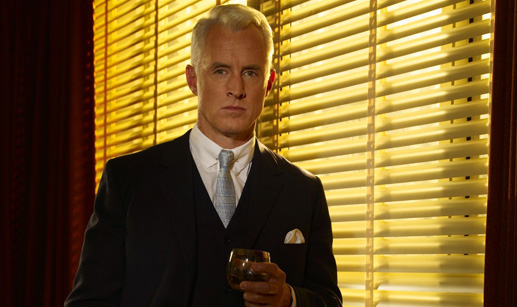
Tuesday June 19, 2012
Quote of the Day
“It’s not exactly a news flash that [Adam] Sandler isn’t making movies for me or people like me, but even by the standards of his lackadaisical, vulgar comedies, 'That’s My Boy' plumbs a new low. (Admittedly, it’s probably not worse than the insulting 'Grown Ups' or the bilious and hateful 'Jack and Jill,' although it’s dirtier than either. Suddenly 'You Don’t Mess With the Zohan' and 'I Now Pronounce You Chuck & Larry,' both of which are basically terrible, look like understated works of Lubitsch-style comic genius.)”
--Andrew O'Hehir in “Adam Sandler Hates You,” his review of “That's My Boy,” which, incidentally, died at the box office.

Monday June 18, 2012
Dreaming of Paul McCartney, 70
Paul McCartney is now six years older than that impossibly old, “Will you still need me/Will you still feed me” age he envisioned in his 20s. He dyes his hair. He's still a Pollyanna (Paulie-anna?) and occasionally shows up at Yankee Stadium wearing a Yankees cap and rooting for the baseball equivalent of the Blue Meanies. He began to seem a bit daft in his 30s, half a lifetime ago, as if all that head-wobbling and pot smoking in his Beatles/Wings days had addled his brain. He's 70 now and you want a bit of John's edge on him. You want to see a little curmudgeon. Why not? He's entitled. Instead he's just titled.
Growing up, he was my favorite Beatle and maybe my favorite person. I could neither sing nor play the guitar (nor bass, nor drums, or Jew's harp), but I still wanted to be him. I tried to droop my eyes like his. I wanted his overbite. I bopped my head around during Christmas carols at Mt. Olivet Church. I remember a girl telling me once I looked like him and I fell on the floor in gratitude, ruining any shot I had with her. Just another day.
I'm sure this informs some part of the dream I had back in 2002. It was right before my friend Joan and I traveled to Europe to bum around and see the sights for a month. It was my first trip to Europe. England wasn't on the schedule:
I'm on the plane to Europe, which is just taking off, when I suddenly realize I don't have anything: no ticket, no passport; it's all back at my apartment. Apparently I left for the airport right from work. All I have is a small bag with me. My seat companion (not Joan) suggests telling the pilot so we can turn the plane around but I don't want to be a bother.
The flight attendants are passing out “Splodes”: lycra-like shirts with numbers on them, sort of like bike racing jerseys. I'm no. 15. Eventually I figure out that splodes are used in case the plane explodes mid-air; it makes it easier to identify our bodies.
I‘ve made it into Europe. I’m doing a Godfather imitation to the amusement of some girl at an outdoor fair, but I'm still worried about the return voyage. Will I be let back into America without a passport? Someone overhears me and tells me it's easy to get back into America—as long as you have money. At this point I become an amalgam of myself and Paul McCartney and I think “It's not a problem then.”
Happy Birthday, Paul. Thanks for the songs. This one was always a favorite:
Monday June 18, 2012
Movie Review: Prometheus (2012)
WARNING: SPOILERS
The first half of Ridley Scott’s “Prometheus,” a prequel to Ridley Scott’s 1979 horror masterpiece “Alien,” raises some fun and intriguing questions. The second half gives us some lame and unsatisfying answers. It’s a smart sci-fi film that gets dumb fast.
In the latter part of the 21st century, archeologists Elizabeth Shaw and Charlie Holloway (Noomi Rapace and Logan Marshall-Green) stumble upon 5,000-year-old cave paintings from different parts of the world that include the same image: a giant man pointing to a five-planet solar system that isn’t visible from Earth. This solar system has a planet, or a moon, which is semi-inhabitable for humans, although its atmosphere, we’re told, would be like sucking on an exhaust pipe. Meaning in 2093 we’ll still have cars with internal combustion engines. Bummer.
But, badda-bing badda-boom, a mission to this planet, funded by the Weyland Corporation, is underway. We see the ship, Prometheus, en route, with its 16 human crew members in stasis, while its lone android, David (Michael Fassbender), studies ancient languages, shoots baskets while riding a bicycle, and watches both the dreams of Ms. Shaw and David Lean’s “Lawrence of Arabia.” He styles his hair in the fashion of a young Peter O’Toole and quotes one of the movie’s more famous lines: “The trick, William Potter, is not minding that it hurts.” Apparently even our robots want to be like movie stars. Or so the movies tell us.
A few months ago, online, I saw a clip from “Prometheus,” in which Weyland Corp. founder Peter Weyland (Guy Pearce), in 2023, gives a TED talk. It’s a good clip, although the “talk” doesn’t quite hold together:
So Weyland expounds on “Lawrence” and “not minding”; on the titan Prometheus, who gave us fire (and thus life), and who was punished by the gods by having an eagle rip out his stomach and eat his liver every day for eternity; and by the fact that, in creating androids, in creating life, “We are the Gods now.” But this clip didn’t make the movie. Too bad. The talk doesn’t quite adhere but the scene provides connective tissue for the movie. It lets us know why, for example, David is watching “Lawrence,” and how, for example, the giant men in the cave drawings might be ancient aliens thought to be gods, and how, for example, the legend of Prometheus, with his ripped-out stomach, might be our first “Alien” story. I.e., it wasn’t an eagle ripping into a stomach; it was an alien ripping out of it.
As in “Alien,” as opposed to the optimistic “Star Trek” world, there are class distinctions aboard Prometheus, and, as in any corporation, a battle for power. Who’s in control of the mission? A hologram of a wizened Peter Weyland (Pearce in make-up) tells the crew that the scientists, Shaw and Holloway, are in charge, but the robot-like Meredith Vickers (Charlize Theron), who, out of stasis, does push-ups while those around her are regurgitating, and who has separate, lavish quarters, obviously objects. Then there’s the captain of the ship, Janek (Idris Elba), but he seems to know his place as employee and glorified chauffeur. “I’m just the captain,” he says more than once with a smile.
There’s also David, who, like almost all androids in sci-fi movies, has ulterior motives.
 So they land, quickly find the alien stronghold, along with giant, godlike images of humanoids (thank you, H.R. Giger!), and evidence of a massacre: bodies piled high by a doorway. But they insist on poking stuff, goo and slime, that we know better not to poke. We, viewers of countless “Alien” movies, know what’s going to happen. They don’t.
So they land, quickly find the alien stronghold, along with giant, godlike images of humanoids (thank you, H.R. Giger!), and evidence of a massacre: bodies piled high by a doorway. But they insist on poking stuff, goo and slime, that we know better not to poke. We, viewers of countless “Alien” movies, know what’s going to happen. They don’t.
Well, some do. David, for example. How does he know? Is he literally reading the writing on the walls?
It all comes apart fast—both mission and movie. Two scared scientists who are left behind, the Shaggy and Scooby of the crew, come across a snake-like alien life-form emerging from a blackish goo, and one insists on practically cooing to it. Bad move, Scoob. It, of course, wraps itself around his arm, breaks it, and when the other scientist tries to cut it off, he gets the alien’s acid-blood sprayed in his face. In seconds, both are mangled toast.
Meanwhile, David has mixed some black goo into the drink of Holloway, who, inexplicably, is distraught that in a few hours time in the alien stronghold they didn’t uncover the secret to life. This guy’s a scientist? Doesn’t he know the slow, plodding nature of the discipline? Earlier, Shaw calls the aliens in the cave painting “engineers,” and assumes, without evidence, that they engineered us. When asked why she assumes this, she echoes her father’s comment about why he believes in an afterlife: “It’s what I choose to believe,” she says. She might as well be a Young Earth Creationist.
Holloway perks up when Shaw informs him that the DNA she recovered from the site matches human DNA exactly, and the two celebrate the way humans do, with booze and bed, but the next morning his eyes are red and he doesn’t feel himself, and during the mission to the site he bends over and his skin starts breaking apart and he pleads to be killed. Vickers, who doesn’t want to be contaminated, obliges. Everyone, it seems, has their agenda. Hers is staying clean. She seems to know instinctively that there’s bad shit out there.
Back on the ship, just after seeing her lover torched in front of her, Shaw is informed, by David, almost maliciously, that though she thought herself sterile, she is in fact pregnant. Three months along. How is that possible? Oh, we know how it’s possible. And we know it’s not human. At which point we get the film’s best, most harrowing scene: Shaw performing computer-aided self-surgery to remove the alien before it gets all Prometheus on her ass (or stomach). There’s a great tension between a sense of urgency (hers and ours) and the computer’s decided lack of it. Once she survives, freezes the alien life form, and makes her way, stumbling down the hallway with a stapled stomach, I, like most in the audience, realized, “Right. She’s this movie’s Ripley.”
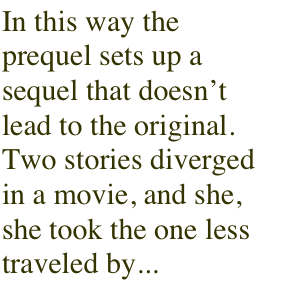 This takes us to the third act, where we discover that a) Peter Weyland is alive and on board, b) Wickers is his daughter, and c) David has uncovered a chamber where a giant humanoid lies in stasis. That’s why Weyland is there. He’s hoping to meet his maker.
This takes us to the third act, where we discover that a) Peter Weyland is alive and on board, b) Wickers is his daughter, and c) David has uncovered a chamber where a giant humanoid lies in stasis. That’s why Weyland is there. He’s hoping to meet his maker.
He does. Awakened, surrounded by puny humans, the giant humanoid listens as David talks to him in what we assume is his own language. Whatever David says, it enrages the giant, and David loses his head (literally), and Weyland meets his maker (figuratively), and the humanoid, with whom we share DNA, starts up his massive, c-shaped spaceship, still working after all these years, to bring it, and stomach-popping aliens, to Earth.
Apparently the giant humanoids are developing these aliens like weapons of mass destruction for the purpose of... wiping us off earth? So they can populate it? Or something? They’re not our engineers, in other words; they’re our engineers of destruction. “We were so wrong,” Shaw says.
She figures all this out pretty quickly, informs Capt. Janek that he needs to stop the alien ship or “There won’t be any Earth to go back to,” and, amid lines of bravado, which they snort like lines of cocaine, he and his remaining crew perform a kamikaze mission and bring the alien ship down. The crashing ship promptly crushes Vickers, who has jettisoned onto the desolate planet in a desperate attempt to survive, and nearly crushes Shaw, who rolls out of the way in time.
So is she the sole survivor on this desolate planet? Nope. The giant humanoid survives as does one of the stomach-popping aliens; and she gets away from the former by releasing the latter.
So now she’s alone? Nope. David, head removed from body, is still functioning, and he informs her there’s another alien ship, which he can pilot. But she doesn’t want to go back to Earth. She wants to go forward to the planet of the giant humanoid aliens. She wants to learn more. As do we. In this way the prequel sets up a sequel that doesn’t lead to the original. Two stories diverged in a movie, and she, she took the one less traveled by, but we don’t get to see if it makes all the difference for another two years or so. Thanks, Ridley.
Sunday June 17, 2012
Hollywood B.O. Is Adam Sandler's 15-Year Reign of Terror Over?
Second weekends of “Madagascar 3” and “Prometheus,” hardly the summer's big blockbusters, beat out first weekends of the latest Tom Cruise movie, “Rock of Ages,” and the latest Adam Sandler comedy, “That's My Boy,” which finished third and fifth, respectively.
The failure of the Sandler movie feels like bigger news to me, since the Cruise flick is hardly his flick. He's barely mentioned in the ads. Plus he plays out of character: '80s hairband rock star rather than 21st-century, short-haired action star.
But Sandler? He's going with his usual schtick, playing obnoxious Wazaaaap party dad to an uptight son played by Andy Samberg. Is Sandler's audience growing up? Having kids of its own? Can't get out of the house even on Father's Day weekend? Because they're not there. In 2010, Sandler's “Grown Ups” opened at $40 mil. In 2011, “Just Go With It” (in February) and “Jack and Jill” (in November) opened at $30 and $25 mil, respectively. This one? $13 mil. The only Sandler movies to open lower were '90s movies before he broke big, and his more recent attempts at serious films: “Reign over Me” at $7 mil in 2007 and “Punch Drunk Love,” in 2003, which, seen as a Paul Thomas Anderson movie rather than an A. Sandler movie, opened with $367K.
Both new movies were poorly reviewed, 23% for “Boy” and 42% for “Rock,” while the two returning movies were better-reviewed, 75% for “M3” and 73% for “Prometheus.” But bad reviews never stopped Sandler's fans before. One wonders what's doing it now.
Meanwhile, “Snow White and the Huntsman” grossed another $13.8 m for a total of $122. That's almost twice as much as “Battleship,” in 11th place with $1.2 mil for a total of $62. Anyone see that coming three months ago?
“MIB 3,” in sixth place with $10, is now at $152, while “The Avengers” added another $8.8, and are $13.3 from being the first non-James Cameron film to cross the $600 million domestic barrier.
The second-string numbers here.

The fall of Adam Sandler: from $40m in 2010 to $25m in 2011 to $13m in 2011.
Sunday June 17, 2012
My Evening with Sissy Spacek
I noticed the movie first. “Hey!” I thought. “Terrence Malick's 'Badlands' is playing at SIFF!”
Only when I bought tickets (for $35/$40) did I learn that “Badlands” was an afterthought to one of the major events at the 2012 Seattle International Film Festival: “An Evening with Sissy Spacek,” in which the Oscar-winning actress accepted SIFF's lifetime achievement award and sat down for a two-hour Q&A with Time magazine's Richard Corliss. The screening of “Badlands,” which starred Spacek and a young Martin Sheen, came later, and, by the time it did, a third of the audience had left. Sad.
I had a good time at the event but questions arise. Why Corliss? Why not a local critic, like John Hartl or Moira MacDonald? One of the best, most entertaining interviewers I've seen is both local and a movie critic: Warren Etheredge of the Warren Report. Why not him?
The audience portion of the Q&A can be a drag—particularly in Seattle. The people raising their hands are generally the people who shouldn't be raising their hands: folks who don't want to ask anything but want to pontificate and blab and unenlighten and waste our time. Thankfully, we didn't get many of those. We got oddities: geeks bearing gifts. They spoke tentatively, then brought out some odd, hand-made doo-dad—a ceramic flying pig dangling on a string, for one—then brought it up to Ms. Spacek, who, to her credit, acted more graciously accepting these things than I do accepting a gift I want from someone I love. She showed her chops right there. She deserved her lifetime achievement award right there.
Did you know, under the name “Spackle,” that she sang a late '60s bubble-gum song called “John You've Gone Too Far This Time,” about how John Lennon in 1969 was no longer the mop-top we all loved? I didn't. Someone menioned that the song is hard to find online but it's actually pretty easy. And pretty awful. It should as least be catchy.
More catchy was this clip we saw as part of her career retrospective:
Just lovely.
After the Q&A, but before the “Badlands” screening, Michael Upchurch, who, with John Hartl, has been covering SIFF for The Seattle Times, came up and mock-chastised me: “Where was your present for Sissy?” he asked. Exactly.
Here's a portion of the Q&A. Apologies, but we were sitting halfway back so the volume isn't the best and the hand-held jumpiness is like out of a Lars von Trier film. Hope no one gets nauseous.
Apologies, too, Sissy, for not bringing you a gift. Next time.
(TURN UP THE VOLUME FOR THIS ONE...)
Saturday June 16, 2012
The Annotated David Brooks
The following appeared on the New York Times op-ed page on Friday. Without annotations.
Democrats frequently ask me why the Republicans have become so extreme. As they describe the situation, they usually fall back on some sort of illness metaphor. Republicans have a mania. President Obama has said that Republicans have a “fever” that he hopes will break if he is re-elected. Obama's kind. I hope it kills them.
 Let me describe it this way: In the 1950s, Dwight Eisenhower reconciled Republicans to the 20th-century welfare state. Between Ike and George W. Bush, Republican leaders basically accepted that model. Um... Wow. So all those attacks on the federal government over the last 30 years were just different ways of 'accepting the Eisenhower model'? Who knew?
Let me describe it this way: In the 1950s, Dwight Eisenhower reconciled Republicans to the 20th-century welfare state. Between Ike and George W. Bush, Republican leaders basically accepted that model. Um... Wow. So all those attacks on the federal government over the last 30 years were just different ways of 'accepting the Eisenhower model'? Who knew?“We have a sense that the economic order we knew in the second half of the 20th century may not be coming back at all — that we have entered a new era for which we have not been well prepared. ... We are, rather, on the cusp of the fiscal and institutional collapse of our welfare state, which threatens not only the future of government finances but also the future of American capitalism.”
So what do you mean by “welfare state”? Social security? Medicare? Highways? Policemen? Speak up, David.
To Republican eyes, the first phase of that collapse is playing out right now in Greece, Spain and Italy — cosseted economies, unmanageable debt, rising unemployment, falling living standards. And Sweden? And Germany? Why are Greece, Spain and Italy seen as harbingers of the U.S.? Doesn't Germany, 'to Republican eyes,' have a bloated health care system? Are Republican eyes paranoid eyes? Can I look through them?
America’s economic stagnation is just more gradual. In the decades after World War II, the U.S. economy grew by well over 3 percent a year, on average. But, since then, it has failed to keep pace with changing realities. The average growth was a paltry 1.7 percent annually between 2000 and 2009. Highlighting stagnant years, which were led by a conservative administration intent on ending the so-called welfare state, isn't exactly a strong argument for ending the so-called welfare state.
It averaged 0.6 percent growth between 2009 and 2011. Well, it does take a while to climb out of a Republican-dug shithole.
Wages have failed to keep up with productivity. It's almost as if the rich keep taking ... and then giving to GOP candidates.
Family net worth is back at the same level it was at 20 years ago. Ditto.
In America as in Europe, Republicans argue, the welfare state is failing to provide either security or dynamism. The safety net is so expensive it won’t be there for future generations. Or we could tax the rich at levels we taxed them at during most of the Reagan administration? Thoughts? Bueller?
Meanwhile, the current model shifts resources away from the innovative sectors of the economy and into the bloated state-supported ones, like health care and education. Bloated like babies in Africa. Numbers would be nice here. Or anywhere. And “like health care and education”? Are you against these things? WTF is the matter with you?
Successive presidents have layered on regulations and loopholes, creating a form of state capitalism in which big businesses thrive because they have political connections and small businesses struggle. I actually agree with this. The secret to your success, David: one good thought out of 20. You're an .050 hitter in the Major Leagues.
The welfare model favors security over risk, comfort over effort, stability over innovation. Money that could go to schools and innovation must now go to pensions and health care. I thought schools were bloated? Two sentences back. Numbers would be nice here. Or anywhere. And when did we stop innovating anyway? The 1930s? The 1960s? Last year? Was this before or after we created the internet?
This model, which once offered insurance from the disasters inherent in capitalism, has now become a giant machine for redistributing money from the future to the elderly. This is the source of Republican extremism: the conviction that the governing model is obsolete. It needs replacing. Or we could tax the rich at levels we taxed them at during most of the Reagan administration?
Mitt Romney hasn’t put it this way. Of course not.
He wants to keep the focus on President Obama. But this worldview is implied in his (extremely vague) proposals. As are yours, David. As are yours.
He would structurally reform the health care system, moving toward a more market-based system. Pardon me, sir, but the free hand of the market needs to examine your prostate.
He would simplify the tax code. He would reverse 30 years of education policy, decentralizing power and increasing parental choice. I thought we already spent 30 years decentralizing power and increasing parental choice. Oh, right. That was centralizing corporate power and increasing corporate choice. My bad.
The intention is the same, to create a model that will spark an efficiency explosion, laying the groundwork for an economic revival. The level of wish fulfillment in this sentence outdoes the level of wish fulfillment in any Hollywood blockbuster. I wanted popcorn while reading it. I wanted to throw up after reading it.
Democrats have had trouble grasping the Republican diagnosis because they don’t have the same sense that the current model is collapsing around them. Or because Republicans aren't upfront about what their proposal entails. Killing social security? Medicare? Highways? Policemen? Speak up, David.
In his speech in Cleveland on Thursday, President Obama offered an entirely different account of where we are. In the Obama version, the welfare-state model was serving America well until it was distorted a decade ago by a Republican Party intent on serving the rich and shortchanging the middle class. Don't be modest. Republicans began distorting our system three decades ago.
In his speech, Obama didn’t vow to reform the current governing model but to rebalance it. The rich would pay a little more and everyone else would get a little more. I'd have the rich pay A LOT more. Erik 2016!
He’d “double down” on clean energy, revive the Grand Bargain from last summer’s budget talks, invest in infrastructure, job training and basic research. Obama championed targeted subsidies and tax credits. Republicans, meanwhile, envision comprehensive systemic change. The G.O.P. vision is of an entirely different magnitude: replace the tax code (with what?), replace the health care system (with what?) and transform entitlements (to what?).
This is what this election is about: Vagueness?
Is the 20th-century model obsolete, or does it just need rebalancing? Is Obama oblivious to this historical moment or are Republicans overly radical, risky and impractical? Are there national issues that require national solutions? Should the wealthiest people pay a smaller percentage in taxes than you and me? Do we want to return to the economic policies of 2001-2009?
Republicans and Democrats have different perceptions about how much change is needed. I suspect the likely collapse of the European project will profoundly influence which perception the country buys this November. David, because of your column, I got off the schneid. I just donated $500 to Obama for America. Thank you.
Friday June 15, 2012
Eric Wedge and the Hobson's Choice
Last night I went to my first Mariners game of the season, a horrid, 6-2 affair againt a bottom-dwelling San Diego team, in which there were hardly any fans in the stands, hardly any Mariners on the basepaths, and too many seagulls circling like vultures in the late innings.
There was also a moment that made me wonder about the intelligence of manager Eric Wedge.
M's down 6-1 in the bottom of the 8th. Franklin Guttierez, in his first game this season, managed a single through the left side of the infield for his first hit of the season and the M's second run of the game. Woo! Now it was 6-2, with men on first and second, and the tying run, Ichiro, in the on-deck circle. And who strode to the plate? Mighty Munenori Kawasaki, often referred to as “Ichiro lite,” but you might as well call him “Ichiro without the on-base percentage.” Dude's batting .189 with a .259 OBP, and, like all the M's, his numbers are worse at Safeco. At home he's batting just .100, 2 for 20, both singles, with a .143 OBP. Fun.
So here we were, down by 4 with two guys on, and we needed a guy to get on base to give us a chance. But the guy at the plate was a guy who rarely got on base.
“Why isn't Wedge pinch-hitting for him?” I wondered aloud. “Does Wedge know what he's doing?”
He does. Here's why Wedge didn't pinch-hit for Kawasaki: Because mighty Dale Thayer (6.19 ERA) was on the mound for San Diego. Thayer's a righty, Kawasaki's a lefty.
But didn't we have any lefties on the bench who could pinch-hit?
Believe it or not, no. They were all in the game. Unless you count Chone Figgins. He's a switch hitter. At home he's hitting .143, which is a little better than Kawasaki; but against righties he's hitting .192, which isn't as good as Kawasaki's .213 against righties. So Kawasaki stayed in the game and popped out to short. The M's never managed another hit and the Padres won the game and swept the series. It's their first series sweep of the year. Congratulations, guys.
And apologies, Eric Wedge. It's gotta be tough to look down a bench and see no better option than a guy hitting .100. No wonders the seagulls were circling.

Mariners baseball: Get after it.
Friday June 15, 2012
Spider-Man's Uncle Ben: Yankees Fan?
I was rewatching Sam Raimi's “Spider-Man” the other day, in anticipation of somethingorother, when, two-thirds of the way through, as Aunt May prays at night, just before the Green Goblin shows up, we get this shot of a framed photo of the now-deceased, gentle, beloved Uncle Ben Parker (Cliff Robertson):
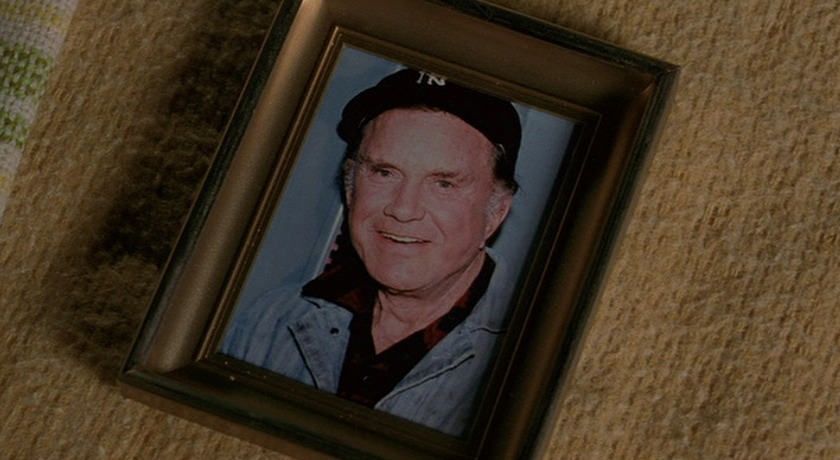
What's that on his head? That can't be ... It's not...
Say it ain't so, Uncle Ben! The man who taught us the greatest lesson in comic books, that “with great power comes great responsibility,” is actually a Yankees fan?
How does that work exactly? With great power comes the ability to cherry-pick other teams' best players? With great power comes asinine behavior? With great power comes loud, douchebag fans?
Thank God for the reboot.
Thursday June 14, 2012
MLB.com Gives Some Clown Answers, Bro
How many times can Major League Baseball screw things up?
This morning I wrote a post about Matt Cain's perfect game, and included a link to a post I'd written three years ago about Mark Buehrle's perfect game and DeWayne Wise's catch within that perfect game. Back then, I'd also linked to the catch, which, of course, was on MLB.com. (MLB doesn't YouTube its videos.) I'm pretty sure I linked to the specific catch, rather than the general MLB.com/videos page. I try to be specific. Especially about perfection.
Now, though, the link took me to the general MLB.com videos page. Bummer.
Ah, but MLB.com has a search function! So I searched for DeWayne Wise, who's done one super-memorable thing during his mostly late-inning, defensive-replacement career: that perfect-game catch.
Here are the titles of videos 1-12 out of the 239 videos MLB.com offered me:
- Soriano earns the save
- Swisher's RBI double
- Teixeira ties it with a walk
- Granderson's RBI groundout
- Jeter's RBI single
- Ludwick's two-run double
- Costanzo's first career hit
- Heisey's RBI double
- Rodney earns the win
- Granderon's 1,000th career hit
- A-Rod's three-run blast
- Falu's first career hit
Wise is with the Yankees now, which is why all the dull Yankees highlights, and they're sorted chronologically. So I looked for a, you know, “sort by importance” function. Maybe something that included some aspect of the search (“DeWayne Wise”) within the title.
But there isn't any “sort by importance” function. There's only this. There's only what MLB offers you. Take it or leave it.
So I left. I wound up searching via Google. And even there, because MLB.com has such SEO problems, it was like the 10th video listed. And even there, the clip offered was one comparing Wise's catch during Buehrle's perfecto with Jackson's catch during Galaragga's near perfecto.
Later, on MLB.com, I plodded through all the DeWayne Wise pages. The catch was on the 14th page listed.
Thanks, Bud.
Seriously, MLB: I'm fine with going on your site to see your videos. I don't mind the 30-second commercials to watch a 15-second clip. Much.
Just help us out with our searches. Because what you've got now? Those are some clown answers, bro.

Thursday June 14, 2012
More Perfection
Jim Caple has a good piece on fans leaving the M's six-pitcher no-hitter before the final out last Friday night. Why would someone do that? he wondered. Don't they know what's going on? Don't they know this is the first no-hitter the Mariners have thrown since Chris Bosio's in 1993?
In their defense, these things are getting a little common. Another no hitter? Right. Wake me when someone throws a perfect game.
Someone should've woken me up last night.
With Matt Cain's perfecto against Houston, we've now had two perfect games this year. The decade isn't even three years old and we've had four thus far. That's as good as the 1990s, which is the most perfect games any decade has seen.
Perfect games used to be as rare as perfection. Now they're as common as Wil Ferrell movies.

I don't include the two from the 1880s, when fouls caught on a bounce were considered outs. That history is too old.
So there are now 20 perfect games in modern history: Four before expansion in 1961; 16 since.
I became a true baseball fan around 1970, when I was 7, and started paying attention to stats when I was about 8, probably because of the hoopla in Minnesota surrounding Harmon Killebrew's 500th homerun. I knew back then, as surely as I knew the numbers 714 and .367, that the last perfect game was thrown against my Twins, in 1968, by the A's Catfish Hunter. I kept waiting for the next one, to wash away this info, but no one threw a perfect game in the 1970s. It was our last decade without one.
Since then, these are the number of perfect games by decade: 3, 4, 2 and 4. And this decade would've had 5 if not for Jim Joyce's blown call. And we're only two and a half years into it.
What does this mean? What's going on? My friend Tim asked that on Facebook. “Is this steroid-era hangover?” he wondered. “Payback's a bitch,” his friend Matt replied.
The highlights of Cain's perfecto are fun. David Schoenfield has a good article here but I don't agree with him on “greatest catch ever” for Gregor Blanco's in the top of the 7th. Helluva catch. Beautiful catch. But I still give it to DeWayne Wise in the top of the 9th in Chicago three years ago. And by that I mean greatest catch ever in a perfect game. I woudn't presume to talk about “all time” here. Not at least without thinking about it for five minutes.
Anyway, congratulations to Matt Cain, Gregor Blanco and the San Francisco Giants. And congratulations to me, too. In the 1970s, I had to wait 13 years before the albatross of “last perfect game thrown” was removed from around my team's neck. This time I had to wait less than two months. There's something to be said for so much perfection.

Wednesday June 13, 2012
SIFFed Out
I saw 10 movies at the 2012 Seattle International Film Festival and was pretty tired by the end of it. SIFF is billed as the longest film fest in the world, 25 days now, 450+ movies, but there are times, particularly when you're caught in the middle of it, when “longest film fest” seems less boast than threat. You want to wave the white flag. You want to go climb a mountain. If you going to the movies you want to see something loud and stupid and with supheroes.
Here are the rankings of the movies I saw, from first to worst, with links to reviews:
- Starbuck: Must-see French-Canadian comedy
- Under African Skies: Documentary on Paul Simon's “Graceland”
- Goodbye: Iran today
- The Revisionaries: Texas today
- Lola Versus: Girls today
- The Revolutionary: The Marxist yesterday
- Wonder Women! The Untold Story of American Heroines: Doc on feminism and boobs
- Hello I Must Be Going: A mopey 35-year-old's big adventure
- A Checkout Girl's Big Adventure: Insipid French fairytale
I'd recommend the first three. Plus half of the fourth. “Checkout Girl” was physically painful.
My 10th film, in case you're wondering, was Terrence Malick's “Badlands” during “An Evening with Sissy Spacek.” More on that later.
None of my movies won any awards. Here's the rundown from the audience and the cognescenti:
2012 SIFF Audience awards
- Best film: “Any Day Now”
- Best documentary: “The Invisible War”
- Best director: Benh Zeitlin, “Beasts of the Southern Wild”
- Best actor: Alan Cumming, “Any Day Now”
- Best actress: Jamie Chung, “Eden”
- Best short film: “Catcam”
2012 SIFF Juried awards
- Best new director: Nicolas Provost, “The Invader”
- Best documentary: “Five Star Existence”
- Best narrative short: “The Extraordinary Life of Rocky”
- Best animated short: “Zergut”
- Best documentary short: “Paradise”
- FIPRESCI Prize for Best New American Film: “Welcome to Pine Hill”
I also heard good things about “Chasing Ice,” “Your Sister’s Sister,” “My Brother the Devil,” “The Fourth State” and “The Intouchables.”

Fun the first time I saw it.
Tuesday June 12, 2012
Quotes of the Day
“Markets don't just happen.”
--Gov. George Romney
“No one in his right mind would today argue that there is no place for the federal government in the reawakening of America. Indeed, we need another Republican-sponsored Marshall Plan for our cities and schools.”
--Henry Cabot Lodge
Both men were urging greater federal involvement in business and education to the platform committee at the 1964 Republican National Convention. According to Rick Perlstein, in his book, “Before the Storm: Barry Goldwater and the Unmaking of the American Consensus” (pg. 374), they were met with “stony silence” by a committee taken over by uncompromising, upstart Goldwaterites—the same type who now run the GOP, and to whom Romney's son, Mitt, now pays obeisance.
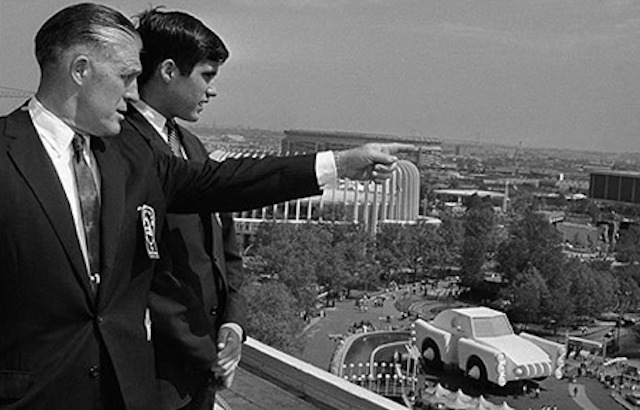
Gov. George W. Romney and son in 1964.
Tuesday June 12, 2012
Movie Review: Hello I Must Be Going (2012)
WARNING: SPOILERS
I miss the Marx Brothers. I miss their centrality to our culture, as they were central in the 1970s, 40 years after their cinematic heyday, when Epstein and Horshack would imitate Chico and Harpo on “Welcome Back, Kotter,” and everyone from Michael Jackson to Hawkeye Pierce to kids on McDonald’s commercials would imitate Groucho. We could all use a little duck-walking and cigar-waggling and leering now and again. We could all use a little poignant nonsense. Last year I asked a twentysomething colleague how much she knew about the Marx Brothers and she revealed her ignorance with her Google search: March brothers. Chico would be proud.
A long way of saying I went into “Hello I Must Be Going” hoping for some knowing Marxian references beyond the title.
I got a few. The film’s protagonist, Amy, (Melanie Lynskey), three-months divorced from her entertainment-attorney husband in Manhattan, and now living with her parents in Westport, Conn., used to watch the Marx Brothers with her father when she was a kid. Now she’s watching them again. We see clips from “Duck Soup” and “Animal Crackers,” with Groucho singing the title song, the absurdity of which I’ve always liked. I laughed out loud when I heard this again:
I’ll do anything you say!
I’ll even stay!
(Yay!)
But I must be....going
It’s one of the few times I laughed out loud at this April-June romantic comedy.
The movie opens with Amy getting up at noon, slumping off to the kitchen for crackers, and then returning to her room to watch “One Day at a Time” reruns on TV. Her mother, Ruth (Blythe Danner), half encourages her, half chastises her to get moving again. She tries to buck her up but brings her down in the peculiar way of mothers. She talks about a friend’s daughter who is now apparently on anti-depressants, or depressaunts as she calls them, Frenchifying the word, legitimizing it, and implies that maybe this is the path for Amy. “Amy, you haven’t left the house in three months,” she says, seeming concerned. Then her real concern emerges. Important guests are arriving for an important dinner. “Honey, I need you to shape up a little. Get something nice to wear.”
To be honest, I only had so much sympathy for Amy. Her circumstances are tough but not that tough. She’s had heartache but no more than the rest of us. She’s been lying around for three months, wasting her life, wasting her parents’ time and money. At some point, you need to look for something to do and do it. You need to find a place, and a talent with which you can make money, or for which someone will pay you, and then do that. Or you do the thing that makes you money and then you do the other thing that fulfills you, which is what most of us do. It can be hard, particularly in our current culture and economy, but Amy and I are still living in America in the 21st century. The luck heaped upon us is still overwhelming.
At the dinner party, which involves a potential client for her lawyer-father Stan (John Rubenstein), the son of that client, 19-year-old Jeremy (Christopher Abbott of HBO’s “Girls”), is the only other person at the table, besides Amy, who looks uncomfortable with the glib, wine-infused conversation. Occasionally he’ll make eyes at her. Eventually he follows her into another room and makes a pass.
Thus every road back to wholeness begins with the distraction of romance.
At some point, fairly early in the movie, I thought, “Wouldn’t it be great if she wound up where she started: groaning at the start of the day and watching tired re-runs on TV?” I thought: Why does she have to realize her self-worth? What is it about her self that’s worthy? That she’s nice? That she takes photos of rivers? She was going to publish a book of her river photos once. Apparently she got distracted by her attorney husband. What was she doing all the time she was married anyway? Was she working? Where? How did she fill her days?
In “Hello I Must Be Going,” written by first-time screenwriter Sarah Koskoff and directed by third-time director Todd Louiso, Amy never finds a job, or a purpose, but she finds enough value in herself to demand alimony from her ex. That’s her big self-esteem moment. Then she and her mother travel the world together. She’ll take pictures of her mother. And, one assumes, rivers.
Groucho: Do you suppose I could buy back my introduction to you?

Amy: slowly dying on her road to self-esteem.
Monday June 11, 2012
Quote of the Day
“When we started writing the show, I said to the writers, ‘In order to write, I think you need to have an idea in your head about what the purpose of life is. It doesn’t matter what idea you have, you just have to have one. So if you think life is a Darwinian struggle for survival, then at any given moment when you’re confused about what to write, you can say, ‘Well, if life is a Darwinian struggle for survival, then I guess this is what we should do.’
“‘But if you’re going to write on this show, you have to provisionally at least go along with what I believe, which is that the reason for living is to love and create. But then you look at the world and you realize that that’s not happening everywhere, is it? There must be a reason why. Why is it not happening? The reason it doesn’t happen is fear.
“People are essentially good, so they want to solve the problem of fear. So they go, ‘I know what I’ll do. I will make money. And if I make enough money, I will then feel safe enough to love and create, and it will immunize me against fear.’ But that’s an illusion, because the fear is too big and the money is never enough.
“The real answer is that people do not need money in order to love and create; they need purpose. So I said to the writers, ‘Armed with that four-pronged idea that love and creation are the positives, fear is the problem, money is the false answer and purpose is the real one, then at any given moment you know how to write a story on ‘Underemployed.’ Every episode, over and over again, is the story of people learning in various ways that the answer to the problems of our age is not money, it is purpose.”
--Craig Wright, playwright, and writer for “Six Feet Under,” “Brothers and Sisters,” and creator of “Dirty Sexy Money” and the new MTV show “Underemployed,” in Jim Walsh's MinnPost article “Craig Wright and MTV's 'Underemployed' Feel the Pain of Millennials”
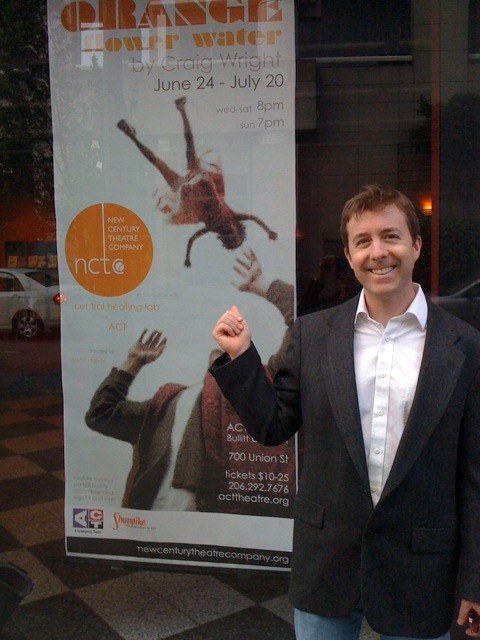
On the way to see Craig Wright's “Orange Flower Water” at the New Century Theater in downtown Seattle, June 2009
Monday June 11, 2012
Movie Review: Moonrise Kingdom (2012)
WARNING: SPOILERS
Wes Anderson’s latest film, “Moonrise Kingdom,” opens with a painting of a house, shifts to a close-up of a dollhouse, then moves onto the activities within the house, the actual house where the painting is hung and the dollhouse is located, the several-storied, precariously placed home of the Bishops, Walt and Laura (Bill Murray and Frances McDormand), who live on the northern, Summers End portion of New Penzance Island off the coast of New England in early September 1965. Yet in true Wes Anderson fashion, the actual house seems like a dollhouse. It’s a plaything. There’s an unreality to it, a right-angled, two-dimensionality. Walt and Laura are always in different rooms, the three boys play board games on the floor, while eldest child Suzy (Kara Hayward), on the cusp of adolescence, walks around in short skirts and white knee socks and reads her books (“The Francine Odysseys,” “Disappearance of the Sixth Grade,” “The Girl from Jupiter”), and from the top floor scans the horizon with a pair of binoculars as if she’s in a crow’s nest. Which, in a way, she is. She feels at sea. She’s searching for land.
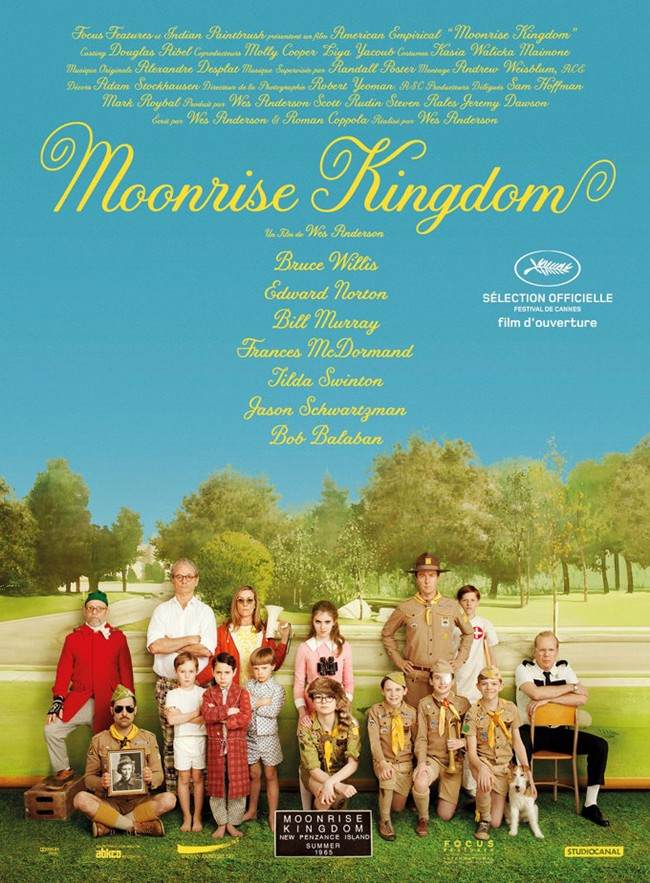 On the other side of the island, with equal right-angled, two-dimensional precision, Scout Master Ward (Ed Norton) of Camp Ivanhoe rises with the morning, chastises his khaki scouts for minor infractions, then sits down to breakfast, with everyone on one side of the picnic table as if it’s a painting of the Last Supper. But one scout, Sam Shakusky (Jared Gilman), is missing. In his tent, behind a poster, Ward finds a perfectly cut hole. “Jiminy Cricket,” he says, confused and slightly hurt, “he flew the coop.”
On the other side of the island, with equal right-angled, two-dimensional precision, Scout Master Ward (Ed Norton) of Camp Ivanhoe rises with the morning, chastises his khaki scouts for minor infractions, then sits down to breakfast, with everyone on one side of the picnic table as if it’s a painting of the Last Supper. But one scout, Sam Shakusky (Jared Gilman), is missing. In his tent, behind a poster, Ward finds a perfectly cut hole. “Jiminy Cricket,” he says, confused and slightly hurt, “he flew the coop.”
The two stories are not unrelated. Sam, with his Barry Goldwater glasses and Davy Crocket coonskin cap (he’s like the mid-1950s), is off to retrieve Suzy, with her miniskirts and raccoon eye makeup (she’s like the mid-1960s), whom he met the year before at a church production of “Noah’s Flood”; and the two, both of whom still have one foot firmly planted in childhood, are running off together to create their own, better world.
Unfortunately, we’re informed by the narrator of the film (Bob Balaban, clad in a Zissou-like red stocking cap) that one of the worst storms of the decade is only three days away. Will the kids be found in time? Will they survive the storm? Is another flood on the way?
During their footloose period, Sam and Suzy fend off an attack from the other khaki scouts, get into their first squabble, make up, read novels, paint, swim, dance to French music, and learn to French kiss. When they’re discovered in a secluded cove, which, in a later watercolor Sam names “Moonrise Kingdom,” they’ve created their own, better world: a world of art and young love.
Exclusion as problem; inclusion as solution
Five years ago, I wrote a piece for MSNBC, “Wes Anderson’s Bruised Souls,” in which I stated the lesson implicit in Anderson’s movies:
Exclusion isn’t necessarily the problem but inclusion is almost always the solution.
I was thinking of Max Fischer in “Rushmore,” and Royal Tenenbaum in “The Royal Tenenbaums”: misfits who don’t mind their misfit status but who must accept their enemies (Herman Blume, Dr. Peter Flynn, Magnus Buchan, Henry Sherman) in order to find final redemption.
For Sam and Suzy, though, exclusion is part of the problem. Neither has friends. Sam is an orphan who lives with uncaring foster parents at a kind of orphan farm. When he goes missing they not only don’t care, they don’t want him back. At Camp Ivanhoe, the other kids, led by the handsome but mean-spirited Redford (Lucas Hedges), don’t like him. This bothers Sam, despite his deadpan expression, more than it ever bothered Max. Max had his crew but Sam is all alone. Near the end of the movie, he confronts Redford, who has, in the interim, been abandoned by his compatriots—who now gather around Sam as the beginning of his amateurish crew—and we get this exchange:
Sam: Why didn’t you like me?
Redford: Why should I? No one else does.
In a typical Wes Anderson story, Redford (and, please, is there a Sundance-related anecdote to that name?) is the enemy Sam must forgive to find redemption. Here, Redford remains an outsider. He knows no forgiveness. Sam has to forgive no one.
Inclusion, however, is still the solution; it’s just not up to Sam and Suzy to provide it. It’s up to the others to include Sam and Suzy. For the first time in a Wes Anderson movie, the world actually adapts to the misfits rather than vice-versa. It makes a place for them. Sam is adopted by Captain Sharp (Bruce Willis), the law enforcement officer on the island, who abandons his affair with Laura Bishop, the realization of which had sent Suzy into the morally ambiguous world of adulthood in the first place, and Sam winds up wearing the same kinds of nerdy clothes as Captain Sharp. (Compare with: the Zissou crew; and Chas and his boys in “Tenenbaums.” Anderson loves his misfits but he loves them more in uniform and at attention.) The real family sucks but the extended family is glorious.
Question: is this a less-profound message than the one found in Anderson’s earlier films? Max and Royal and Mr. Fox all revel in their differences but still grow to accept others; they became more expansive and open. Sam remains the same; it’s the world that becomes more expansive and accommodating. The lesson feels both Pollyannaish and passive. It feels like a step back.
Give me someplace flat
Let me admit, first, that I’m always excited by a new Wes Anderson film. His movies, full of color and quirks and small joys, are uniquely his. At the same time, as I leave the theater and work through what I’ve just seen, I’m invariably disappointed. He has a love of flatness—in character, in cinematography—that I find visually interesting but intellectually stagnant.
When Laura Bishop, for example, searches for Suzy in their home, she calls with her bullhorn to her left, then straight up to Walt on the second floor. Everything is at a 90-degree angle. When Sam outruns the other boys in a clearing, he doesn’t trace a serpentine path. He heads straight out, makes a sharp right, makes another sharp right, then another. Rather than cut corners and catch him, they all follow haplessly behind. His characters can’t cut corners. They’re condemned to right angles.
In this way, his moviemaking accentuates the flatness of the screen by employing head-on shots and profiles and right angles. A Wes Anderson movie using 3-D technology would be an interesting experiment. Would we even be able to tell?
At the same time, what does this two-dimensionality mean? Is Anderson attempting to make a movie seem like a book? Because he loves books? Because his characters love books?
His characters are similarly flat. There’s a deadpan rigidity to them. Anderson needs particularly good actors to bring them to life. Gene Hackman is the classic example. Ed Norton is now another. There’s a sweetness to Scout Master Ward that comes through as he loses, first, one Khaki Scout, then his whole troop, then his commission. As he sinks, as he loses everything, his humanity grows. As a result, he, and not Sam, the protagonist, learns the Wes Anderson lesson in “Moonrise Kingdom”: in losing the world, he gains the world. Sam? He’s too busy creating his own perfect world, which, by its very nature, will be temporary, and as precarious as a big treehouse atop a tall, thin tree.
Maybe this is the key to understanding Wes Anderson. With each film, Anderson, like so many of his characters, creates his own perfect world; then he presses it flat, as if in the pages of a book, to preserve it and keep it for as long as possible.
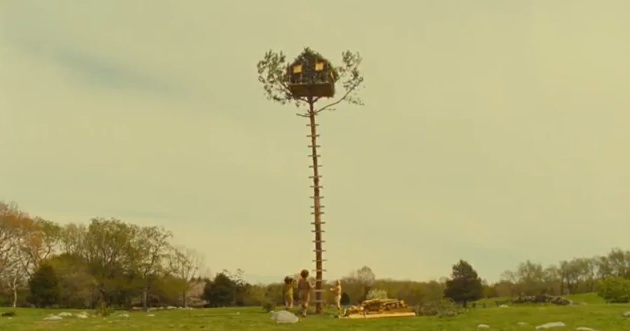
Sunday June 10, 2012
Hollywood B.O.: Madagaswhatever Wins Weekend
Which one is “Madagascar” again? Right, the one with Ben Stiller. Apologies. It's animals and famous voices in multiple sequels and I get it confused with “Ice Age” or “Kung Fu Panda” or whatever. One of those.
So it won the weekend. Hey! Congrats. Its third iteration. It grossed $60 mil. The first one in 2005 opened to $47m on its way to $193, the second opened to $63m on its way to $180. But each grossed over half a billion worldwide so here's the third. Grossed $60m on its way to... $170? Judged by all critics, it's fresh (76%). Judged by top critics, it's rotten (58%). The important thing is that moviegoers in Brazil and Slovakia like it.
“Prometheus,” the “Alien” prequel, grossed $50 mil. Maybe I'll see it. Not much of a fan of prequels. Who is? They're stories for when your characters have died off, or, like Richard Gere in “An Officer and a Gentleman,” have nowhere else to go.
Every other movie dropped fast: “Snow White,” 59%; “MIB 3,” 51%; even “The Avengers,” after their thus-far $571m run domestic (third all time), and $1.39 billion run worldwide (third all time), is a bit tuckered, and dropped 47%. Our boys, and va-va-voom girl, wouldn't mind a little shawarma about now.
The movie I saw, Wes Anderson's “Moonrise Kingdom” (review up tomorrow), finished 10th, with $1.% mil, but it only played in 96 theaters. Thanks for shit, Focus Features.
Question: Which Wes Anderson movie is his biggest box office hit? Answers in the comments field.
The animated weekly numbers here.
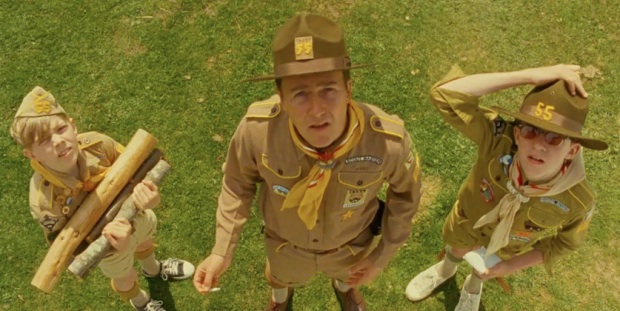
Scout Master Ward and his khaki scouts looking up at the 4,000+ theaters in which “Madagascar 3” played. It played in 96. Distribution does not love Wes Anderson.
Saturday June 09, 2012
The Politics of Resenting Those with Less
“We can't justify foreign aid funds which went to the purchase of extra wives for some tribal chiefs in Kenya.”
—Then-GE spokesman and sometime actor Ronald Reagan in a speech to the Young Republicans Convention in February 1964. “Our money” going to “bad black people” was merely a forerunner to Reagan's “welfare queen” stump speech in the 1970s, which helped Reagan ride into the White House in November 1980 and change the country.
The above quote is from “Before the Storm: Barry Goldwater and the Unmaking of the American Consensus,” by Rick Perlstein; pg. 336. (Much recommended.) According to Perlstein, the speech was received “with delerium” by Republicans, who obviously haven't changed much in the past 50 years. They‘re still filled with delerium. They’re still fostering resentment of those with less. And they're still harping on Kenya.
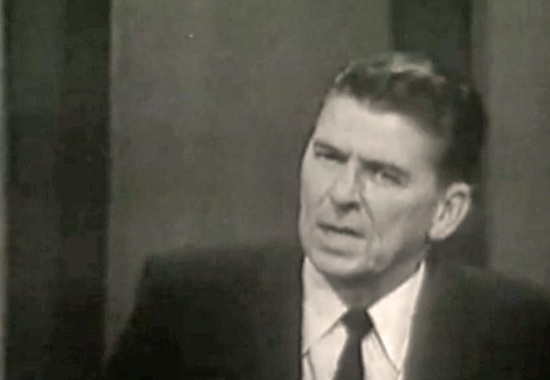
Ronald Reagan in 1964.
Friday June 08, 2012
Movie Review: The Revolutionary (2012)
WARNING: GANG OF SPOILERS
“You missed it.”
That’s what Ben Bradlee tells Woodward and Bernstein after reading one of their early Watergate stories in “All the President’s Men,” and that’s what I thought leaving the world premiere of “The Revolutionary,” a documentary, locally produced, about 91-year-old local Sidney Rittenberg, who, as a high-ranking member of the Chinese Communist Party from 1946 to 1980, was once called “The most important foreigner in China since Marco Polo.”
 Rittenberg was a labor lefty out of Charleston, South Carolina in the 1930s, when everyone in labor was a lefty, before the politics of resentment meant resenting those with less rather than more; and then, like everyone else, he was drafted after Pearl Harbor. Unlike everyone else, he was taught Chinese and sent to China. After the war, Chinese party leaders asked him to stay. “We need an engineer to help us build a bridge from the Chinese people to the American people,” they said. He asked to be a member of the party. He stayed. He felt content. “I’m doing what I should be doing,” he felt.
Rittenberg was a labor lefty out of Charleston, South Carolina in the 1930s, when everyone in labor was a lefty, before the politics of resentment meant resenting those with less rather than more; and then, like everyone else, he was drafted after Pearl Harbor. Unlike everyone else, he was taught Chinese and sent to China. After the war, Chinese party leaders asked him to stay. “We need an engineer to help us build a bridge from the Chinese people to the American people,” they said. He asked to be a member of the party. He stayed. He felt content. “I’m doing what I should be doing,” he felt.
He had his own long march to Yan’an in 1946, where he met Mao Zedong for the first time. “It’s like a picture out of history,” he remembers thinking, “and I’m now part of that history.”
This is big for Sidney Rittenberg: being part of history.
He’s told Mao wants to spend two days talking about America but we don’t get that conversation. He says Mao wanted good relations with the U.S. because he didn’t want to be dependent on the U.S.S.R. He says the U.S. was thinking ideologically here and Mao wasn’t.
There’s a nice interlude about the Hollywood movies Mao, Zhou Enlai and other party leaders watched each week. Laurel and Hardy movies were favorites.
Then Chiang Kai-shek and the Kuomintang are driven to Taiwan, the Communists come to power, and, when the dust clears, Rittenberg, a man who had Mao’s ear, is suddenly imprisoned as a capitalist spy. He winds up in Beijing Prison No. 2, in solitary confinement, for six years. His Chinese wife divorces him. He nearly goes insane. “Every day,” he says. “you’re sitting there with your own potential madness sitting across from you. Watching you. And you know it’s either you or him.” He was finally released, he believes, “Because Josef Stalin did the best thing he ever did in his life: He died.”
A more far-seeing man, or a man less enamored of China and/or communism, might have left Communist China at this point, but Rittenberg was not that man. He went to work for Radio Beijing, got remarried, had four kids—who mostly go unmentioned. We hear from his wife briefly in the doc.
That may be the doc’s biggest problem. Except for a minute’s worth of monologue from Wang Yulin, his second and current wife, this is a single-source news story. It’s just Rittenberg talking in a chair, or in front of his book shelf, or at other strategic points in his home in the Pacific Northwest. Every once in a while the camera pans over a period photo or a propaganda poster. But we get no footage from China, no supplementary interviews with people who knew him, no references to the newspapers of the day. Did Rittenberg’s defection, such as it was (he never renounced U.S. citizenship), make the newspapers back home? He’s not mentioned in The New York Times, for example, until Linda Charlton does a write-up upon his return in 1980: ‘Son of America’ Is Home to Tell About Chinese In-Laws. (But I had to look that up after the screening.) Did the Charleston papers write about him when he was in China? Did The Daily Worker? Did the CIA?
If Rittenberg was a wiser, more insightful man, the single-source issue wouldn’t be such an issue. He says of Mao, “He was a great hero and a great criminal all rolled into one,” which feels true to me, but of his own life, at least as relayed in this doc, there’s an odd disconnect. He, or documentarians Lucy Ostrander, Irv Drasnin and Don Sellers, can’t seem to connect the fragments of his life into a narrative that makes much sense.
As a foreigner in Communist China, which became increasingly xenophobic as the Great Leap Forward leads to the Cultural Revolution, he seems self-deluded or myopic. When he’s put into solitary confinement again in 1967, he concocts his own Confucian saying: “Man who climbs out on limb should listen carefully for sound of saw.” He says he couldn’t hear the sound of the saw until it was too late. But he could never hear the sound of the saw. That’s his problem.
He remained in solitary until 1977.
What was the appeal? That’s what I still don’t get. Was it the communism? Was it China itself? Was it both? Was it being part of history? Does he regret those days? Is he a communist now? A socialist? A capitalist? Is he capitalist now the way that China is capitalist now? What happened to his four kids when he was in solitary and Wang Yulin was being reeducated? Did they become members of the Red Guard? Did they denounce their parents? Were they denounced themselves for being half-American?
Nothing.
I’m also not a fan of the narration, performed by Irv Drasnin, a former news correspondent, because his voice has the deep, faux authority of a former news correspondent. At times it reminded me of the narration in those 1950s Disney nature films that we were forced to watch in elementary school. It’s a voice both deep and cloying. It has all the answers and it’s there to tell us the way the world works. It grates.
The story of Sidney Rittenberg and his time in China is a good story. I hope someday a documentarian will be engineer enough to build a bridge between it and an audience.
Thursday June 07, 2012
Quote of the Day
These are the days of miracle and wonder
This is the long distance call
The way the camera follows us in slo-mo
The way we look to us all
The way we look to a distant constellation
That's dying in a corner of the sky
These are the days of miracle and wonder
And don't cry baby, don't cry, don't cry
—Paul Simon, “The Boy in the Bubble,” from his album “Graceland”
Wednesday June 06, 2012
Getting Better All the Time (Can't Get No Worse): Your 2012 Seattle Mariners Offense
The good news: After one-third of a season, the Seattle Mariners, the worst-hitting team in baseball for the last three years, now ranks 11th (out of 30 teams) in runs scored in the Majors. Yay!
The bad news: They're 27th, 28th, and 26th in batting average, OBP, and slugging percentage. Yikes!
 How is this possible? How can a team with such lousy batting percentages score so many runs?
How is this possible? How can a team with such lousy batting percentages score so many runs?
It's partly a matter of opportunity. The team leads the Majors in games played. They've scored more often because they've played more often.
They've also, as Rob Neyer attests, hit incredibly well (third in the AL in OPS) with runners in scoring position.
Here are their rankings in various offensive categories:
- Games: 1st (59)
- At-bats: 3rd (1967)
- Runs: 11th (243)
- Hits: 20th (461)
- Doubles: 12th (100)
- Triples: T-12th (11)
- Home Runs: T-14th (54)
- Total Bases: 17th (745)
- Batting Average: 27th (.234)
- On Base Percentage: 28th (.296)
- Slugging Percentage: 26th (.379)
- OPS: 27th (.675)
- Strikeouts: 5th (446)
- Walks: 15th (176)
- Intentional Walks: 29th (5)
- Hit By Pitch: 30th (3)
- GIDP: 22nd (38)
- Ground balls: 20th (681)
- Fly balls: 3rd (863)
The HBP thing is interesting. The home runs are nice to see. Our team OBP will be helped without the likes of Chone Figgins (.250 OBP) and if the M's played John Jasso at catcher (.350 OBP) more often than Miguel Olivo (.225 OBP).
Either way, the overall numbers recall Paul McCartney's refrain “I have to admit it's getting better/ It's getting better all the time.” Mainly because they also recall John Lennon's counter refrain: “Can't get no worse.”
Wednesday June 06, 2012
Movie Review: The Revisionaries (2012)
WARNING: SPOILERS
Don McLeroy, the Bryan, Tex., dentist and young-Earth creationist who served on the Texas State Board of Education from 1998 to 2010, including a stint as its controversial chair from 2007 to 2009, is a genial, garrulous boob. Bald, moustached, and portly, he has a “gee whiz” quality to him. His face often resolves itself into a self-satisfied smile after he makes what he thinks is a telling point at BOE meetings, but mostly his smile is open and unaffected. He tends to preach his creationist doctrine to those who can’t answer back—dental patients with tubes in their mouths; Sunday School kids at Grace Bible Church—and he’s pretty darn enthusiastic about it. “Were there dinosaurs on the Ark?” he asks the kids, then answers his own question. “Sure there were!” He’s the kind of man who likes to answer his own questions.
He’s also the man most responsible for the recent rightward shift in our nation’s textbooks—and he’s pretty darn enthusiastic about it.
 “We want to make sure our children are taught good, solid American history,” he says to a phalanx of reporters during Scott Thurman’s documentary, “The Revisionaries.” He believes that evolution is bunk, that the Earth is 10,000 years old, and that history and science experts don’t know what they’re talking about. “Somebody’s gotta stand up to experts!” he says during a speech at a Texas Tea Party convention. To applause.
“We want to make sure our children are taught good, solid American history,” he says to a phalanx of reporters during Scott Thurman’s documentary, “The Revisionaries.” He believes that evolution is bunk, that the Earth is 10,000 years old, and that history and science experts don’t know what they’re talking about. “Somebody’s gotta stand up to experts!” he says during a speech at a Texas Tea Party convention. To applause.
So how did McLeroy, and the people of Bryan, Tex., who kept voting him into office, get to decide the standards for our nation’s textbooks?
Basically: Publishers craft their textbooks to the standards of the biggest buyers, and Texas is currently the biggest buyer. According to a University of Texas study, between 45 and 85 percent of classrooms use Texas state textbooks.
“The Revisionaries” is mostly a character study. If you come in knowing, as I did, something of the power and the cultural make-up of the Texas SBOE, you come away knowing faces, and places, and a little more about the debate itself.
You learn there are 15 board members. They sit in high-backed chairs. There are two black members and one Hispanic member but the board is mostly dominated by white conservative Christians like McLeroy and Cynthia Dunbar, a lawyer and teacher at Pat Robertson’s Regent University, who believes, among other things, 1) the founding fathers created a Christian nation; 2) government should be guided by the Bible; 3) public education is a “deceptive tool of perversion”; and 4) the establishment of public schools is unconstitutional. And she’s helping decide on the standards for those public schools.
There are progressives, or at least non-reactionaries, such as Ron Wetherington, a professor of anthropology at Southern Methodist University (i.e., an expert), and Kathy Miller, the no-nonsense president of the Texas Freedom Network, an organization fighting religious-right initiatives. They have their say. But every progressive step forwards seems to involve two culturally conservative steps back.
The doc opens with a SBOE debate on whether to continue talking about “strengths and weaknesses” of the theory of evolution. It’s voted down but a moment later a new amendment is added to include “all sides” of the debate, which, from a scientific perspective, is meaningless. But that passes.
In 2009, the Texas legislature removes McLeroy from his post as chair of the SBOE. Yay! But this simply frees him to offer amendment after amendment to the social studies standards. Boo! We get a flurry of them: that Margaret Sanger, the birth-control pioneer, be included because she “and her followers promoted eugenics”; that language be inserted about Ronald Reagan’s “leadership in restoring national confidence” in the 1980s. At one point, in a laugh-out loud moment, McLeroy suggests eliminating the phrase “hip-hop” and inserting the words “country music.”
Unfortunately, too much of this debate is without context. What do the textbooks say now? What did they say 10 years ago? Twenty? What did they say when I was growing up? I seem to remember, as I got older, learning that what I’d learned in, say, elementary school, was a simplification or outright fabrication: George Washington and the cherry tree and Abe Lincoln walking a mile in the snow and the sole heroism of Paul Revere’s ride. How necessary are these simplifications? Is there a danger in them? There’s something to be said for learning the standards before taking apart the standards, but are our textbooks ultimately too anodyne to foster curiosity and a thirst for true knowledge? Do they instead foster a desire for myth and absolutes? Is that the good, solid American history McLeroy wants taught?
The great unspoken in the doc is that textbooks have always been dull beasts. I was a kid who actually liked school, but even I groaned with boredom when textbooks were opened. How do we make sure our kids don’t groan with boredom?
Also unspoken: What McLeroy wants to do with the science standards is the opposite of what he wants to do with the social studies standards. He wants to foster doubt about the theory of evolution, and he wants to foster certainty about American exceptionalism. Can’t someone ask which he prefers: doubt or certainty? Can’t someone suggest that we do to Ronald Reagan what he wants to do to Charles Darwin? Talk about “strengths and weaknesses”? Give “all sides”?
Moot point: By the end of the doc, McLeroy is gone, at least from the SBOE, because he finally loses an election by 400-some votes; but he keeps popping up elsewhere: on “The Colbert Report,” in the pages of USA Today. And others have picked up his SBOE mantle and are carrying it forward. To where? That’s the key. In 2000, then-presidential candidate George W. Bush, a product of Texas public schools, asked, “Is our children learning?” Now we have to ask, “What is they learning?”
“The amount of power I have,” McLeroy says at one point, referring to his chairmanship of the Texas State Board of Education, “boggles my mind.”
Ours, too.
Tuesday June 05, 2012
Quote of the Day
“That you're not very talented needn't be the end of it.”
--John Irving (my literary No. 5 hitter) in his memoir, Trying to Save Piggy Sneed, p.131.
Monday June 04, 2012
Movie Review: Starbuck (2011)
WARNING: SPOILERS
“Starbuck” is a small joy of a film: sweet without being cloying, gentle without being dull, and, above all, unassumingly, organically funny.
David Wozniak (Patrick Huard) is a genial bear of a middle-aged man. He’s affable, forgetful, bumbling, with a strong back, a widening middle, and a mane of dark hair. He’s the delivery driver for his father’s boucherie but can’t drive across town without getting a parking ticket. He’s dating a local police officer, Valerie (Julie LeBreton), but never invites her over because he’s growing pot in his apartment. He’s a friend to all and no one, a punchline within his own family, going nowhere and not really resenting it. Under his old warm-up jacket he wears the worn T-shirts of favorite hockey, futbol and baseball teams. He’s 42 and you get the feeling he’s been sleeping on a couch half his life. He’s been hibernating. He’s about to wake up.
He’s awakened at the start of this movie by local toughs, French-Canadian gangsters, who want the $80,000 he owes. 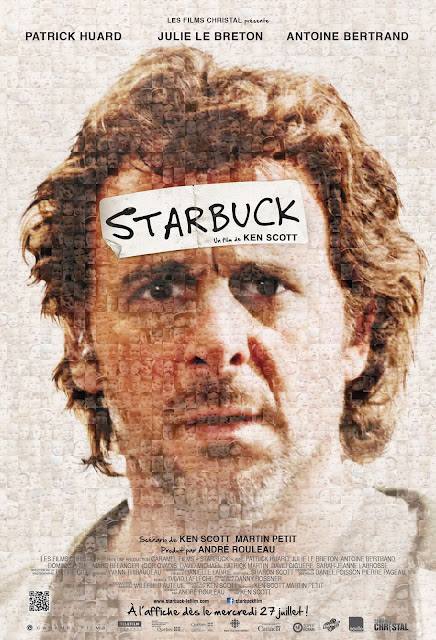 Later that day, he discusses it sheepishly with one of his brothers at the family butcher shop.
Later that day, he discusses it sheepishly with one of his brothers at the family butcher shop.
Brother: How much do you owe?
David: 80.
Brother: 80...?
David: ...thousand.
Brother: 80 thousand?
David: When you say it with a face like that, it sounds like a lot.
Everyone else is more interested in the jerseys. David has volunteered to get the jerseys for their own futbol squad and they assume he’ll screw it up. They keep reminding him, he keeps assuring them, until finally he explodes: “I have the jerseys!” There’s a pause until one responds, matter of factly, “He obviously doesn’t have the jerseys.”
He doesn’t. Attempting to retrieve them, he gets into an argument with a man in a sportscar who has taken his parking space, and while he’s arguing the shopkeeper closes shop. He has to talk him into reopening the shop, by which point he’s got another parking ticket. But he’s got the jerseys. “They’re in the van,” he tells his friends. Cut to: the van being towed because of the parking tickets. Cut to: the taking of the team picture, with everyone but David looking annoyed, and everyone but David attired in something besides the team’s red jersey.
Then his life gets complicated.
One of the running gags in the film involves all the different people who break into his apartment. The gangsters are first. A slick lawyer is second. He informs him that during the period between 1988 and 1990, under the pseudonym “Starbuck,” David donated sperm 693 times at a local sperm bank. (We later learn he was earning money to take his Polish-immigrant parents to Italy before his mother died.) Of those donations, 533 kids were born. Of those 533, 142 are enjoined in a class-action lawsuit to overturn the sperm bank’s confidentiality agreement and uncover who he is.
Oh, and Valerie’s pregnant, too.
There are good, honest bits on the horrors of children. “Never reproduce,” his brother with a pregnant wife tells him. His lawyer and friend (Antoine Bertrand), who must contact the local bar to get his license back to take David’s case, talks about his post-parent impotence. David wonders how he can use such language in front of his kids, but his friend remains unfazed. “I can say whatever I want,” he responds. “They don’t listen to me. They don’t pick up the frequency of my voice.” Even level-headed Valerie worries about what kind of mom she will be. She sees the snotty-nosed kids at the local playground and wants to smack them around.
All of David’s kids, of course, with the exception of Valerie’s, are in their early 20s now. David is given a manila envelope with the names and stories of each. He’s told not to look at it. Being David, he can’t resist.
The first is a professional soccer player. He and his lawyer attend a game and whoop it up. The second is a would-be actor working as a barista. David takes over for him so he can make an important audition. The third is a young drug addict. David takes her to the hospital when she ODs.
In this manner, anonymously, and seeing himself less as father-figure than guardian angel, he makes contact and tries to help those who need it. He’s as curious about them as they are about him. One is a lifeguard, another is a street musician, a third is developmentally disabled and living in an institution. David follows one offspring around town, a handsome gay man seemingly meeting boyfriend after boyfriend, until he hooks up with a girl in front of a fancy hotel. David follows them inside and into a conference hall where—he slowly realizes—he’s attending a meeting the 142 children of Starbuck. By this point he’s standing, looking around in disbelief at all of the life he’s helped create, and he’s asked, by the moderator, the street musician (played by French-Canadian musician David Giguère), why he’s there and what he wants. He claims to be the adoptive father of the developmentally disabled child who can’t make it. But he bucks them all up. He tells them that they may not know their biological father but they now know half-brothers and sisters. They now have another family. Everyone applauds.
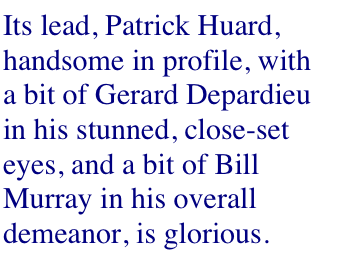 “Starbuck” has its problems. All of the characters are a little too good-hearted. Maybe it’s a Canadian thing. The gangsters, for example, have the patience to wait out the rest of the film, and break no bones, merely hold David (and then, more horrifically, his father) underwater in a bathtub. The second time they do it to David, in the midst of all his problems, he doesn’t even struggle. He seems to be thinking, “Well, this is one way out.”
“Starbuck” has its problems. All of the characters are a little too good-hearted. Maybe it’s a Canadian thing. The gangsters, for example, have the patience to wait out the rest of the film, and break no bones, merely hold David (and then, more horrifically, his father) underwater in a bathtub. The second time they do it to David, in the midst of all his problems, he doesn’t even struggle. He seems to be thinking, “Well, this is one way out.”
Then there’s the scene with the drug addict, Julie, played by former child actress Sarah-Jeanne Labrosse. David helps her, trusts her, and the next morning she doesn’t betray that trust. Problem solved. Anyone who knows anyone who’s alcoholic or a substance abuser knows that one morning is nice, but it’s one morning.
And how did David wind up owing $80 K anyway? It’s the opening salvo that drives the rest of the film but it doesn’t fit into his T-shirt and sweatpants lifestyle. Is he a gambler? Did he sink all of that money into sports memorabilia or harebrained business schemes? How do we know he won’t do it again?
Even so, the script by Ken Scott and Martin Petit, which won the Genie Award for best French-Canadian screenplay last year, goes in interesting, unexpected directions, and it never stops being funny. Its lead, meanwhile, Patrick Huard, handsome in profile, with a bit of Gerard Depardieu in his stunned, close-set eyes, and a bit of Bill Murray in his overall slacker demeanor, is glorious.
“Starbuck” winds up celebrating what it mocks (fatherhood, for example) but in a way that never tips over into schmaltz. Its joys are small: a baby’s hand in the tip of your finger; a montage of people jumping off a dock. Its laughs are big.
Saturday June 02, 2012
Quote of the Day
“Why don’t I believe in God? No, no no, why do YOU believe in God? Surely the burden of proof is on the believer. You started all this. If I came up to you and said, “Why don’t you believe I can fly?” You’d say, “Why would I?” I’d reply, “Because it’s a matter of faith.” If I then said, “Prove I can’t fly. Prove I can’t fly see, see, you can’t prove it can you?” You’d probably either walk away, call security or throw me out of the window and shout, ‘’F—ing fly then you lunatic.””
--Ricky Gervais, “A Holiday Message from Ricky Gervais: Why I'm an Athiest,” The Wall Street Journal.

Later in the article, there's this: “You see, growing up where I did, mums didn’t hope as high as their kids growing up to be doctors; they just hoped their kids didn’t go to jail. So bring them up believing in God and they’ll be good and law abiding. It’s a perfect system. Well, nearly. 75 percent of Americans are God-fearing Christians; 75 percent of prisoners are God-fearing Christians. 10 percent of Americans are atheists; 0.2 percent of prisoners are atheists.”
Friday June 01, 2012
Movie Review: A Checkout Girl's Big Adventure (Les tribulations d'une caissière) (2011)
WARNING: SPOILERS
“A Checkout Girl’s Big Adventure” is hardly a cashier du cinema.
Here’s a scene three-quarters of the way through that exemplifies its monumental stupidity, its arc de stupid, its tour imbecile.
Our title character, Solweig (Déborah François), a cashier at a Target-like store, is being followed into the women’s locker room (cashiers have locker rooms in France?) by the creepy, petty floor manager, Mercier (Jean-Luc Couchard), who has just found out—ah ha!—that the mysterious blogger, misscheckingout.com, who has gotten over a million hits expounding on customer-service matters, and whose posts have led to the beginning of a nationwide strike by checkout girls in France (are there no checkout boys in France?), is, in fact ... Solweig! She’s the one who’s making the lives of management miserable! So what does he do with this information? How does he handle Solweig, who, he now knows, has the ear of the nation and a forum with which to talk to millions about every aspect of her day?
He sexually assaults her, of course. Wouldn’t anyone?
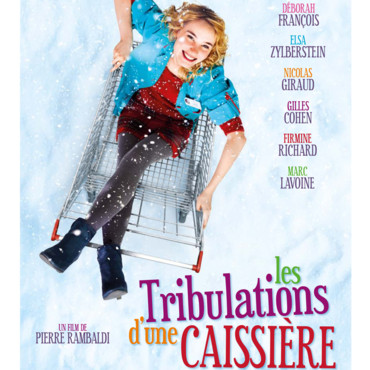 But wait! At that moment, passing by, is a young, handsome man dressed in a Santa Claus suit. (It’s Christmastime.) He’s named Charles (Nicolas Giraud), and he has a thing for Solweig, and she for him, because one night when it was snowing as prettily as it snows in snowglobes, she, in the midst of breaking up with a boyfriend we’ve never seen, slips in the snow and Charles emerges from a limo to help her up. Like in a fairy tale! He also gives her his phone number, which is subsequently besmirched and made illegible by her bratty 10-year-old brother, whom she is raising alone, so of course she can’t call and make a date and continue along the path of young love. Fortunately, he finds out about her, since her store ID card slips from her purse as she’s leaving a tutoring gig, where the tutee, another bratty thing who thinks it’s cool to talk in hip-hop slang, just happens to be ... wait for it ... Charles’ brother! So now he knows where she works. He can ask her out.
But wait! At that moment, passing by, is a young, handsome man dressed in a Santa Claus suit. (It’s Christmastime.) He’s named Charles (Nicolas Giraud), and he has a thing for Solweig, and she for him, because one night when it was snowing as prettily as it snows in snowglobes, she, in the midst of breaking up with a boyfriend we’ve never seen, slips in the snow and Charles emerges from a limo to help her up. Like in a fairy tale! He also gives her his phone number, which is subsequently besmirched and made illegible by her bratty 10-year-old brother, whom she is raising alone, so of course she can’t call and make a date and continue along the path of young love. Fortunately, he finds out about her, since her store ID card slips from her purse as she’s leaving a tutoring gig, where the tutee, another bratty thing who thinks it’s cool to talk in hip-hop slang, just happens to be ... wait for it ... Charles’ brother! So now he knows where she works. He can ask her out.
Except he delays. He’s wondering: Is she a teacher? Is she a cashier? What is she? And rather than ask, he dresses up as Santa Claus so he can spy on her without revealing himself. But when Mercier attempts to rape her, he reveals himself: he bursts in, head-butts Mercier, gapes at Solweig, then flees.
But wait! Our heroine, who is sweet, pretty and rather self-satisfied for someone with such a shitty job, has just been revealed as a hugely successful blogger, then assaulted by her scummy boss, then saved by the man of her dreams. What does she do? Why, she follows the man of her dreams into the parking lot to thank him. No no, I'm sorry, that would make too much sense. No, she follows him out into the parking lot ... to berate him for making her lose her job. Seriously. “Now I’ve lost my job!” she wails. “I’ve lost everything because of you!” Because of him? Because he saved her from rape? From her boss? She can get fired for that?
Besides, doesn’t she get it? A million hits. Talked about on the nightly news. Fomenting a national strike. How can she not see the upside of all of this? Surely it means a book deal. Maybe even a best-seller. Perhaps called, as this film is called, Les tribulations d'une caissière.
Because we can see it. We can see it a mile off.
“Checkout Girl” could’ve been good. Its topic is a relevant one. Many of us have been there. I worked as a cashier for a number of years at a bookstore in Seattle, and I too was driven crazy by the mindless, endless repetition, the sometime-nasty customers, the often insipid management. I once wrote a short story called “Bags” about a cashier who anthropomorphizes the bags he’s supposed to give away; who treats the bags as more human than the customers. It began:
The question about the bags was the penultimate part of an eight-step procedure Scott Widdershins repeated 240 times a day, 4800 times per month, or approximately 28,800 times in his first half year at the Pine Avenue branch of R & R Books. The procedure began with a greeting (“Hello”) and segued into a request for a form of payment (“Cash, check, or charge?”); then, while the purchases were being rung up, and though it was not recommended in The R & R Employees Handbook, Scott usually attempted some kind of conversation with the customer (about literature, or the local sports team, or, daringly, politics); afterwards, credit card slip signed, driver's license number confirmed, change given, Scott asked about the bags. “Would you like a bag?” he asked. There were five types at R & R Books--small, medium and large (paper), medium and large (plastic)--and if the answer was affirmative, and once a preference for paper or plastic was sorted out, Scott slipped their purchases into the properly-sized bag, thanked them, and turned to help the next customer coming down the line.
(Sorry about Widdershins.)
“Checkout Girl” has some of that. In her blog posts she writes about the weight of all the goods they scan every day: a ton, she says; an elephant’s worth of stuff. But her posts, at least translated into English, seem too general and obvious to garner any kind of attention, let alone a million hits, let alone the ear of the nation.
But of course it’s a fairy tale.
The biggest part of the fairy tale? That she’s trapped in her job. She’s blonde, with movie-star looks, and a hugely popular forum. What can’t she do? Her checkout mates include a heavyset black woman with two jobs and too many kids; a peppy Muslim girl with two jobs, one kid and another on the way; and a middle-aged white journalist for a nefarious magazine who is trying to uncover misscheckingout.com. When she does, when she exposes Solweig as a star, she, in a sense, releases both white girls from the checkout-girl trap. They go on to better things. The colored girls remain behind. Your fairy tale isn’t everyone’s fairy tale.
“Les tribulations d'une caissière” was apparently recommended for the Seattle International Film Festival this year by a sponsor, the French embassy in San Francisco, and for that I’d like to thank them. Because it’s a movie that furthers cultural understanding. It reminds us that French films aren’t always as good as “L’Heure d’ete,” or “Un Prophete,” or “Des hommes et des dieux.” Some are as awful as the worst crap coming out of Hollywood.
Merci.
Baseball's Active Leaders, 2023
What Trump Said When About COVID
Recent Reviews
Everything Everywhere All at Once (2022)
Black Panther: Wakanda Forever (2022)
Doctor Strange in the Multiverse of Madness (2022)
Spider-Man: No Way Home (2021)
The Cagneys
A Midsummer Night's Dream (1935)
Something to Sing About (1937)
Angels with Dirty Faces (1938)
A Lion Is In the Streets (1953)
Man of a Thousand Faces (1957)
Never Steal Anything Small (1959)
Shake Hands With the Devil (1959)







